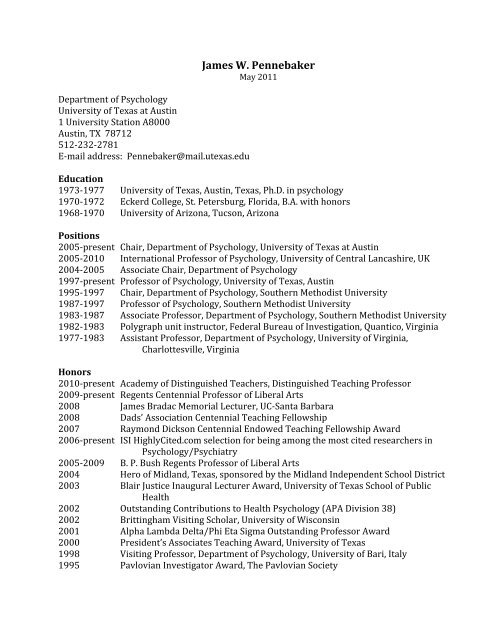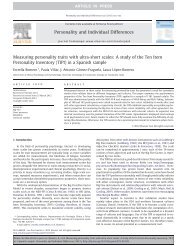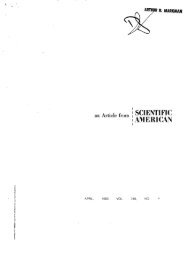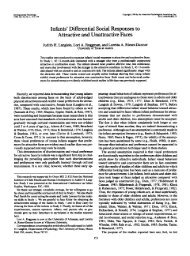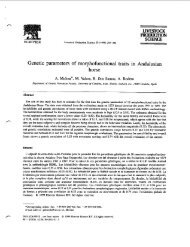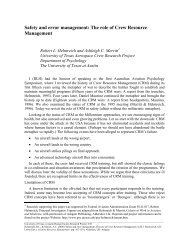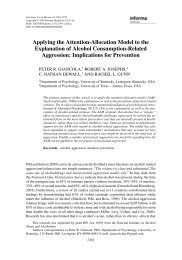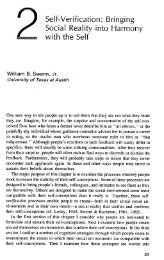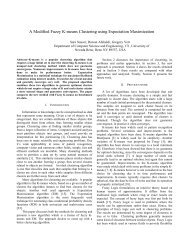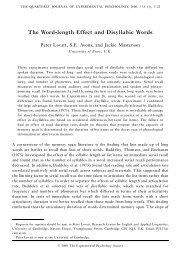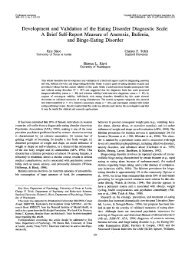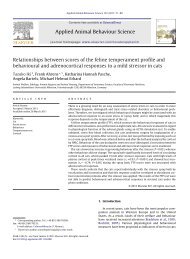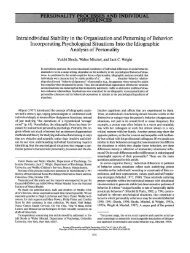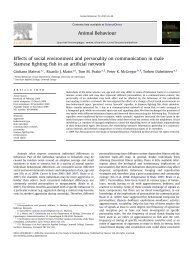James W. Pennebaker - HomePage Server for UT Psychology
James W. Pennebaker - HomePage Server for UT Psychology
James W. Pennebaker - HomePage Server for UT Psychology
You also want an ePaper? Increase the reach of your titles
YUMPU automatically turns print PDFs into web optimized ePapers that Google loves.
<strong>James</strong> W. <strong>Pennebaker</strong> <br />
May 2011 <br />
<br />
Department of <strong>Psychology</strong> <br />
University of Texas at Austin <br />
1 University Station A8000 <br />
Austin, TX 78712 <br />
512‐232‐2781 <br />
E‐mail address: <strong>Pennebaker</strong>@mail.utexas.edu <br />
<br />
Education <br />
1973‐1977 University of Texas, Austin, Texas, Ph.D. in psychology <br />
1970‐1972 Eckerd College, St. Petersburg, Florida, B.A. with honors <br />
1968‐1970 University of Arizona, Tucson, Arizona <br />
<br />
Positions <br />
2005‐present Chair, Department of <strong>Psychology</strong>, University of Texas at Austin <br />
2005‐2010 International Professor of <strong>Psychology</strong>, University of Central Lancashire, UK <br />
2004‐2005 Associate Chair, Department of <strong>Psychology</strong> <br />
1997‐present Professor of <strong>Psychology</strong>, University of Texas, Austin <br />
1995‐1997 Chair, Department of <strong>Psychology</strong>, Southern Methodist University <br />
1987‐1997 Professor of <strong>Psychology</strong>, Southern Methodist University <br />
1983‐1987 Associate Professor, Department of <strong>Psychology</strong>, Southern Methodist University <br />
1982‐1983 Polygraph unit instructor, Federal Bureau of Investigation, Quantico, Virginia <br />
1977‐1983 Assistant Professor, Department of <strong>Psychology</strong>, University of Virginia, <br />
Charlottesville, Virginia <br />
<br />
Honors <br />
2010‐present Academy of Distinguished Teachers, Distinguished Teaching Professor <br />
2009‐present Regents Centennial Professor of Liberal Arts <br />
2008 <strong>James</strong> Bradac Memorial Lecturer, UC‐Santa Barbara <br />
2008 Dads’ Association Centennial Teaching Fellowship <br />
2007 Raymond Dickson Centennial Endowed Teaching Fellowship Award <br />
2006‐present ISI HighlyCited.com selection <strong>for</strong> being among the most cited researchers in <br />
<strong>Psychology</strong>/Psychiatry <br />
2005‐2009 B. P. Bush Regents Professor of Liberal Arts <br />
2004 Hero of Midland, Texas, sponsored by the Midland Independent School District <br />
2003 Blair Justice Inaugural Lecturer Award, University of Texas School of Public <br />
Health <br />
2002 Outstanding Contributions to Health <strong>Psychology</strong> (APA Division 38) <br />
2002 Brittingham Visiting Scholar, University of Wisconsin <br />
2001 Alpha Lambda Delta/Phi Eta Sigma Outstanding Professor Award <br />
2000 President’s Associates Teaching Award, University of Texas <br />
1998 Visiting Professor, Department of <strong>Psychology</strong>, University of Bari, Italy <br />
1995 Pavlovian Investigator Award, The Pavlovian Society
1993 D.H.C. (Docteur Honoris Causa ‐ ‐ honorary doctorate degree), Catholic University <br />
of Louvain, Louvain‐La‐Neuve, Belgium. <br />
1990 Visiting Professor, Division of Medical <strong>Psychology</strong>, University of Ulm, Germany <br />
1989 Outstanding Researcher Award, Sigma Xi, Southern Methodist University <br />
1989 Hilgard Visiting Professor, Department of <strong>Psychology</strong>, Stan<strong>for</strong>d University <br />
<br />
Research Grants <br />
2009‐2013 NSF grant, Minerva, Modeling discourse and social dynamics (co‐PI) <br />
2008‐2011 Homeland Security (START), Language of political leaders <br />
2008‐2000 Sandia National Labs, Language analysis of a working group <br />
2008‐2010 U.S. Army, Writing among Army couples after deployment <br />
2007‐2011 Army Research Institute, Language and social dynamics <br />
2007‐2009 DOD and CIFA, Viewing text through English and Arabic eyes <br />
2005‐2007 NSF workshop on language and deception <br />
2005‐2006 U.S. Army, Timing of expressive writing to maximize coping <br />
2004‐2007 Binational Science Foundation, Math models of language and personality (coPI) <br />
2000‐2007 NIMH Grant, Interpersonal disclosure processes and health <br />
1996‐2000 NIMH Grant, Interpersonal disclosure processes and health <br />
1994‐1997 NSF Grant, Disclosure, language, and health <br />
1991‐1994 NSF Grant, Cognition, disclosure and health <br />
1989‐1991 NSF grant, The psychological consequences of the 1989 Cali<strong>for</strong>nia earthquake <br />
1987‐1989 NSF grant, Inhibition, disclosing, and health <br />
1984‐1987 NIH grant, Perception of physical symptoms and blood pressure <br />
1981‐1984 NIH grant, Symptoms and blood glucose: Evaluation and utilization, with D.J. Cox <br />
1980‐1981 NSF grant, Psychological impact of Mt. St. Helens Volcano, with Darren Newtson <br />
1977‐1978 NIH Biomedical Support Grant, University of Virginia <br />
<br />
Teaching Experience <br />
Undergraduate Introductory <strong>Psychology</strong>, Health <strong>Psychology</strong>, Methodology, Social <strong>Psychology</strong>, <br />
Social <strong>Psychology</strong> of Religion, Social and Political Institutions (1854‐<br />
present) <br />
Graduate Language and Personality, Social <strong>Psychology</strong> of Language, Stress and <br />
Psychosomatics, Methodology, Social <strong>Psychology</strong>, Eating Behavior and <br />
Disorders, Social Physics, Words and Social Processes <br />
<br />
Ongoing Research Projects <br />
1. Most of my current research deals with the nature of language and social processes. <br />
How do the words we use reflect our underlying feelings, thoughts, personality, and behavioral <br />
tendencies? In answering this question, we have developed a text analysis program, LIWC, that <br />
has allowed us to analyze language use on a word‐by‐word level <strong>for</strong> any text – whether a book, <br />
poem, song, webpage, or natural conversation. We are finding that the “junk words” people use <br />
– articles, pronouns, prepositions – are powerful markers of their linguistic styles and these <br />
styles are often linked to other aspects of their lives. <br />
2. I am continuing some of my earlier work with disclosure, inhibition, and <br />
psychosomatic disease. The goal of the project is to develop and test the idea that failure to <br />
confide a traumatic experience is associated with physiological stress. The stress of not <br />
2
confiding (i.e., inhibition) is exacerbated by increased ruminations about the event. The <br />
cumulative effects of inhibition and rumination increase the probability of disease over time. <br />
Requiring individuals to confide or disclose upsetting experiences reduces specific autonomic <br />
levels and, over time, disease rates. Recent work focuses on how translating emotional <br />
experiences into language affects how people naturally interact with others. <br />
3. A longstanding interest of mine has been to understand how individuals perceive <br />
physical symptoms, moods, and physiological change. Studies deal with the relative <br />
contributions of internal physiological activity compared with situational cues in influencing <br />
individuals' self‐reports and more objective indicators of physical symptoms, emotions, and <br />
behaviors. Recent work deals with sex differences in the perceptions of internal versus external <br />
in<strong>for</strong>mation. <br />
<br />
Publications <br />
Books <br />
Colligan, M., <strong>Pennebaker</strong>, J.W. & Murphy L. (Eds.) (1982). Mass Psychogenic Illness: A Social <br />
Psychological Perspective. Hillsdale, NJ: Erlbaum. <br />
Domínguez Trejo, B., <strong>Pennebaker</strong>, J.W., & Olivera López (2008). Estrés Postraumático (EPT). <br />
Mexico City: Trillas. <br />
Paez, D., Valencia, J.F., <strong>Pennebaker</strong>, J.W., Rimé, B., & Jodelet, D. (Eds.) (1998). Memorias <br />
Colectivas de Procesos Culturales y Políticos. San Sabastian, Spain: Universidad del Pais <br />
Vasco Servicio Editorial. <br />
<strong>Pennebaker</strong>, J.W. (1982). The <strong>Psychology</strong> of Physical Symptoms. New York: Springer‐Verlag. <br />
<strong>Pennebaker</strong>, J.W. (1990). Opening Up: The Healing Powers of Confiding in Others. New York: <br />
William Morrow. <br />
<strong>Pennebaker</strong>, J.W. (1997). Opening Up: The Healing Power of Expressing Emotions (Revised <br />
edition). New York: Guil<strong>for</strong>d Press. (Translations in German, Spanish, Korean, Japanese, <br />
Indonesian, Hungarian, and Polish). <br />
<strong>Pennebaker</strong>, J.W. (Ed.) (1995). Emotion, Disclosure, and Health. Washington, DC: American <br />
Psychological Association. <br />
<strong>Pennebaker</strong>, J.W. (2004). Writing to heal: A guided journal <strong>for</strong> recovering from trauma and <br />
emotional upheaval. Oakland, CA: New Harbinger Press. <br />
<strong>Pennebaker</strong>, J.W. (in press). The secret life of pronouns: How our words reflect who we are. New <br />
York: Bloomsbury Press. <br />
<strong>Pennebaker</strong>, J.W., Paez, D., & Rimé, B. (Eds.) (1997). Collective Memories of Political Events: <br />
Social Psychological Perspectives. Hillsdale, NJ: Erlbaum. <br />
Traue, H. & <strong>Pennebaker</strong>, J.W. (Eds.) (1993). Emotion, Inhibition, and Health. Seattle: Hogrefe & <br />
Huber Publishers. <br />
Wegner, D.M. & <strong>Pennebaker</strong>, J.W. (Eds.) (1993). Handbook of Mental Control. Englewood Cliffs, <br />
NJ: Prentice‐Hall. <br />
<br />
3
Software <br />
<strong>Pennebaker</strong>, J.W., Booth, R.J., & Francis, M.E. (2007). Linguistic Inquiry and Word Count: LIWC <br />
2007. Austin, TX: LIWC (www.liwc.net). <br />
<strong>Pennebaker</strong>, J.W., Francis, M.E., & Booth, R.J. (2001). Linguistic Inquiry and Word Count: LIWC <br />
2001. Mahwah, NJ: Erlbaum Publishers (www.erlbaum.com). <br />
<strong>Pennebaker</strong>, J.W., & Francis, M.E. (1999). Linguistic Inquiry and Word Count: LIWC. Erlbaum <br />
Publishers. <br />
Websites <br />
http://www.psy.utexas.edu/<strong>Pennebaker</strong>. University of Texas at Austin website with links to <br />
research, publications, teaching, and other websites. <br />
http://www.utpsyc.org. A research website devoted to the longterm collection of surveys, <br />
online exercises, and writing tasks with feedback. <br />
http://www.wordwatchers.wordpress.org. A website built <strong>for</strong> the 2008 presidential election. A <br />
consortium of researchers relying on computerized text analysis contributed to the site. <br />
http://www.liwc.net. A site that provides in<strong>for</strong>mation and sells copies of the computerized text <br />
analysis program Linguistic Inquiry and Word Count, LIWC. Profits from the sales are <br />
donated to the University of Texas at Austin <strong>Psychology</strong> Department. <br />
http://www.analyzewords.com. A site that automatically analyzes tweets from Twitter accounts <br />
providing emotion and personality feedback <strong>for</strong> Twitter users and their friendship <br />
networks. The data generated from this project is used <strong>for</strong> language research. <br />
Journal Articles and Book Chapters<br />
Baddeley, J., & <strong>Pennebaker</strong>, J.W. (in press). An expressive writing intervention <strong>for</strong> military<br />
couples reuniting after deployment: A randomized controlled trial. Journal of Traumatic<br />
Stress.<br />
Ramírez-Esparza, N., Chung, K. C., Sierra-Otero, G., & <strong>Pennebaker</strong> J. W. (in press). Crosscultural<br />
constructions of self-schemas: Americans and Mexicans. Journal of Cross-<br />
Cultural <strong>Psychology</strong>.<br />
Baddeley, J., Daniel, G., & <strong>Pennebaker</strong>, J.W. (in press). How Henry Hellyer’s language use<br />
<strong>for</strong>etold his suicide. Journal of Crisis Intervention and Suicide Prevention.<br />
Seih, Y., Chung, C.K., & <strong>Pennebaker</strong>, J.W. (in press). Experimental manipulations of<br />
perspective taking and perspective switching in expressive writing. Cognition & Emotion.<br />
Smyth, J.M., <strong>Pennebaker</strong>, J.W., & Arigo, D. (in press). What are the health effects of<br />
disclosure? In T. Revenson, A. Baum, and P.C. Chaoprang (Eds), Handbook of health<br />
psychology. New York: Taylor & Francis.<br />
Chung, C.K., & <strong>Pennebaker</strong>, J.W. (in press). Linguistic Inquiry and Word Count (LIWC). In<br />
Phil McCarthy and Chutima Boonthum (Eds.), Applied Natural Language Processing and<br />
Content Analysis: Identification, Investigation, and Resolution. Hershey, Pennsylvania:<br />
IGI Global.<br />
4
Skelton, J.A., & <strong>Pennebaker</strong>, J.W. (in press). Visceral perception. In B. Goldstein (Ed.), Sage<br />
Encyclopedia of Perception. Thousand Oaks, CA: Sage.<br />
<strong>Pennebaker</strong>, J. W., & Chung, C. K. (in press). Expressive writing, emotional upheavals, and<br />
health. In J. F. Evans (Ed.), Wellness & writing connections. Enumclaw, WA: Idyll Arbor,<br />
Inc.<br />
<strong>Pennebaker</strong>, J. W., & Chung, C. K. (in press). A summary of the effects of expressive writing on<br />
physical and mental health. Proceedings of the 2007 Turkish-German Psychiatry<br />
Conference.<br />
<strong>Pennebaker</strong>, J. W., & Chung, C. K. (in press). Expressive writing and its links to mental and<br />
physical health. In H. S. Friedman (Ed.), Ox<strong>for</strong>d handbook of health psychology. New<br />
York, NY: Ox<strong>for</strong>d University Press.<br />
<strong>Pennebaker</strong>, J.W. (2011). The secret life of pronouns. New Scientist, 3 September 2011, 50-53.<br />
<strong>Pennebaker</strong>, J.W., & Ireland, M.E. (2011). Using literature to understand authors: The case <strong>for</strong><br />
computerized text analysis. Scientific Study of Literature, 1, 34-48.<br />
Carmack, CL, Basen-Engquist, K, Yuan, Y, Greisinger, A, Rodriguez-Bigas, M, Wolff RA,<br />
Barker, T, Baum, G, <strong>Pennebaker</strong> JW. (2011). Feasibility of an expressive-disclosure group<br />
intervention <strong>for</strong> posttreatment colorectal cancer patients: Results of the Healthy<br />
Expressions study. Cancer (doi: 10.1002/cncr.26110).<br />
Ireland, M. E., Slatcher, R. B., Eastwick, P. W., Scissors, L. E., Finkel, E. J., & <strong>Pennebaker</strong>, J.<br />
W. (2011). Language style matching predicts relationship <strong>for</strong>mation and stability.<br />
Psychological Science.<br />
Tausczik, Y. R., & <strong>Pennebaker</strong>, J. W. (2011). Predicting the quality of online mathematics<br />
contributions from users' reputations. Proceedings of the 2011 Conference <strong>for</strong> the<br />
Computer Human Interaction Society (CHI 2011).<br />
Fernandez Sedano, I., & <strong>Pennebaker</strong>, J.W. (2011). La superacion del trauma a traves de la<br />
escritura. In D. Paez,C.M. Beristain, J.L. Gonzalez, N. Basabe, & J. Dr Rivera (eds.),<br />
Superando la violencia colectiva y construyendo cultura de paz (Overcoming collective<br />
violence and building a culture of peace), pps 343-351. Madrid: Editorial Fundamentos<br />
Coleccion Ciencia.<br />
Vedhara, K. Brant, H., Adamopoulous, E., Byrne-Davis, L., Mackintosh, B., Hoppitt, L., Tovee,<br />
M. & <strong>Pennebaker</strong>, J. (2010). A preliminary investigation into whether attentional bias<br />
influences mood outcomes following emotional disclosure. International Journal of<br />
Behavioural Medicine, 17, 195-206.<br />
Ireland, M.E., & <strong>Pennebaker</strong>, J.W. (2010). Language style matching in writing: Synchrony in<br />
essays, correspondence, and poetry. Journal of Personality and Social <strong>Psychology</strong>, 99,<br />
549-571.<br />
Liehr, P., Marcus, M.T., Carroll, D., Granmayeh, L.K., Cron, S.G., & <strong>Pennebaker</strong>, J.W. (2010).<br />
Linguistic analysis to assess the effect of mindfulness intervention on self-change <strong>for</strong> adults<br />
in substance use recovery. Substance Abuse, 31, 79-85.<br />
<strong>Pennebaker</strong>, J.W. (2010). Expressive writing in a clinical setting. The Independent Practitioner,<br />
30, 23-25.<br />
5
De Giacomo, P.D., L’Abate, L., <strong>Pennebaker</strong>, J.W., & Rumbaugh, D. (2010). Amplifications and<br />
applications of <strong>Pennebaker</strong>’s analogic to digital model in health psychology promotion,<br />
prevention, and psychotherapy. Clinical <strong>Psychology</strong> and Psychotherapy, 17, 355-362.<br />
Hancock, J. T., Beaver, D. I., Chung, C. K., Frazee, J., <strong>Pennebaker</strong>, J. W., Graesser, A. C., &<br />
Cai, Z. (2010). Social language processing: A framework <strong>for</strong> analyzing the communication<br />
of terrorists and authoritarian regimes. Behavioral Sciences in Terrorism and Political<br />
Aggression, Special Issue: Memory and Terrorism, 2, 108-132.<br />
Gonzales, A.L., Hancock, J.T., & <strong>Pennebaker</strong>, J.W. (2010). Language indicators of social<br />
dynamics in small groups. Communications Research, 37, 3-19.<br />
Tausczik, Y.R., & <strong>Pennebaker</strong>, J.W. (2010). The psychological meaning of words: LIWC and<br />
computerized text analysis methods. Journal of Language and Social <strong>Psychology</strong>, 29, 24-<br />
54.<br />
Scholand, A. J., Tausczik, Y. R., & <strong>Pennebaker</strong>, J. W. (2010). Linguistic analysis of workplace<br />
computer-mediated communication. Proceedings of Computer Supported Cooperative<br />
Work 2010.<br />
<strong>Pennebaker</strong>, J.W., Facchin, F., & Margola, D. (2010). What our words say about us: The effects<br />
of writing and language. In V. Cigoli and M. Gennari (Eds.), Close relationships and<br />
community psychology: An international perspective (pp. 103-117). Milan, Italy:<br />
FrancoAngeli.<br />
Sexton, J.D., <strong>Pennebaker</strong>, J.W., Holzmueller, C.G., Wu, A.W., Berenholtz, S.M., Swoboda,<br />
S.M., Pronovost, P.J., & Sexton, J.B. (2009). Care <strong>for</strong> the caregiver: Benefits of expressive<br />
writing <strong>for</strong> nurses. Progress in Palliative Care, 17, 307-312.<br />
Niederhoffer, K. G., & <strong>Pennebaker</strong>, J. W. (2009). Sharing one's story: On the benefits of<br />
writing or talking about emotional experience. In S. J. Lopez and C. R. Snyder (Eds.),<br />
Ox<strong>for</strong>d handbook of positive psychology, 2nd ed., (pp. 621-632). New York, NY: Ox<strong>for</strong>d<br />
University Press.<br />
Baddeley, J. L., & <strong>Pennebaker</strong>, J. W. (2009). Expressive Writing. In W. T. O’Donohue & J. E.<br />
Fisher, (Eds.), Cognitive behavior therapy: Applying empirically supported techniques in<br />
your practice, 2nd Ed. (pp. 197-201). New York: Wiley.<br />
<strong>Pennebaker</strong>, J.W. (August 9, 2009). What is “I” saying? (guest post). The Language Log.<br />
http://languagelog.ldc.upenn.edu/nll/?p=1651<br />
Argamon, S., Koppel, M., <strong>Pennebaker</strong>, J.W., & Schler, J. (2009). Automatically profiling the<br />
author of an anonymous text. Communications of the Association <strong>for</strong> Computing<br />
Machinery (CACM), 52, 119-123.<br />
Ramirez-Esparza, N., Mehl, M.R., & <strong>Pennebaker</strong>, J.W. (2009). Are Mexicans More or Less<br />
Sociable than Americans? Insights from a Naturalistic Observational Study. Journal of<br />
Research in Personality, 43, 1-7.<br />
Fernandez, I., Paez, D., & <strong>Pennebaker</strong>, J.W. (2009). Comparison of expressive writing after the<br />
terrorist attacks of September 11 th and March 11 th . International Journal of Clinical and<br />
Health <strong>Psychology</strong>, 9, 89-103.<br />
6
Slatcher, R.B., Vazire, S., & <strong>Pennebaker</strong>, J.W. (2008). How Americans use instant messaging.<br />
Personal Relationships, 15, 407-424.<br />
<strong>Pennebaker</strong>, J.W., & Ireland, M. (2008). Analyzing words to understand literature. In J.<br />
Auracher and W. van Peer (Eds.), New beginnings in literary studies (pp24-48).<br />
Newcastle, UK: Cambridge Scholars Publishing.<br />
Chung, C. K., Jones, C., Liu, A., & <strong>Pennebaker</strong>, J. W. (2008). Predicting success and failure in<br />
weight loss blogs through natural language use. Proceedings of the 2008 International<br />
Conference on Weblogs and Social Media, pp.180-181.<br />
Chung, C. K., & <strong>Pennebaker</strong>, J. W. (2008). Revealing dimensions of thinking in open-ended selfdescriptions:<br />
An automated meaning extraction method <strong>for</strong> natural language. Journal of<br />
Research in Personality, 42, 96-132.<br />
<strong>Pennebaker</strong>, J.W., & Chung, C.K. (2008). Computerized text analysis of Al-Qaeda transcripts.<br />
In K. Krippendorff & M.A. Bock (Eds.), A content analysis reader (pp 453-465). Thousand<br />
Oaks, CA: Sage.<br />
Petrie, K.J., <strong>Pennebaker</strong>, J.W., & Sivertsen, B. (2008). Things we said today: A linguistic<br />
analysis of the Beatles. <strong>Psychology</strong> of Aesthetics, Creativity, and the Arts, 2, 197-202.<br />
Ramirez-Esparza, N., Gosling, S.D., & <strong>Pennebaker</strong>, J.W. (2008). Paradox lost: Unraveling the<br />
puzzle of simpatía. Journal of Cross Cultural <strong>Psychology</strong>, 39, 703-715.<br />
Chung, C.K., & <strong>Pennebaker</strong>, J.W. (2008). Variations in spacing of expressive writing sessions.<br />
British Journal of Health <strong>Psychology</strong>, 13, 15-21.<br />
Smyth, J., Hockemeyer, J., Heron, K., Wonderlich, S., & <strong>Pennebaker</strong>, J. (2008). Prevalence,<br />
type, disclosure, and severity of trauma and adverse events in college students. Journal of<br />
American College Health, 57, 69-76.<br />
Ramirez-Esparza, N., Chung, C. K., Kacewicz, E., & <strong>Pennebaker</strong>, J. W. (2008). The psychology<br />
of word use in depression <strong>for</strong>ums in English and in Spanish: Testing two text analytic<br />
approaches. Proceedings of the 2008 International Conference on Weblogs and Social<br />
Media, pp.102-108.<br />
<strong>Pennebaker</strong>, J.W. (2008). Forward. In Australian Centre <strong>for</strong> Grief and Bereavement (Ed).,<br />
Rememberings: A collection of poetry and prose submitted by bereaved people. Vol.1<br />
(page 3). Australian Centre <strong>for</strong> Grief and Bereavement Inc: Victoria, Australia.<br />
<strong>Pennebaker</strong>, J.W. (2008). Choice words: How we talk when we talk about politics. Texas<br />
Observer, 100 (May 30, 2008), 27-28.<br />
Smyth, J.M., & <strong>Pennebaker</strong>, J.W. (2008). Exploring the boundary conditions of expressive<br />
writing: Finding the right recipe. British Journal of Health <strong>Psychology</strong>, 13, 1-7.<br />
Newman, M.L., Groom, C.J., Handelman, L.D., & <strong>Pennebaker</strong>, J.W. (2008). Gender differences<br />
in language use: An analysis of 14,000 text samples. Discourse Processes, 45, 211-246.<br />
<strong>Pennebaker</strong>, J.W., & Gonzales, A. (2008). Making history: Social and psychological processes<br />
underlying collective memory. In J.V. Wertsch and P. Boyer (Eds.), Collective memory<br />
(pp. 110-129). New York: Cambridge University Press.<br />
7
Wolf, M., Horn, AB.., Mehl, M.R., Haug, S., <strong>Pennebaker</strong>, J. W., & Kordy, H. (2008).<br />
Computergestützte quantitative Textanalyse: Äquivalenz und Robustheit der deutschen<br />
Version des Linguistic Inquiry and Word Count [Computer-aided quantitative text analysis:<br />
Equivalence and robustness of the German adaption of the Linguistic Inquiry and Word<br />
Count]. Diagnostica, 54, 85-98.<br />
<strong>Pennebaker</strong>, J.W., Chung, C.K., Ireland, M., Gonzales, A., & Booth, R.J. (2007). The<br />
development and psychometric properties of LIWC2007. [Software manual]. Austin, TX:<br />
LIWC.net<br />
Argamon, S., Koppel, M., <strong>Pennebaker</strong>, J.W., & Schler, J. (2007). Mining the blogosphere: Age,<br />
gender and the varieties of self-expression. First Monday, 12 (Peer-reviewed journal on<br />
the internet) http://firstmonday.org/issues/issue12_9/argamon/index.html<br />
Krantz, A.M., & <strong>Pennebaker</strong>, J.W. (2007). Expressive dance, writing, trauma, and health: When<br />
words have a body. In I.A. Serlin, J. Sonki-Henderson, R. Brandman, and J. Graham-Pole<br />
(Eds.), Whole person healthcare, Volume 3 (pp 201-229). Westport, CT: Praeger<br />
Publishers.<br />
Mehl, M.R., Vazire, S., Ramirez-Esparza, N., Slatcher, R.B., & <strong>Pennebaker</strong>, J.W. (2007). Are<br />
women really more talkative than men? Science, 317, 82.<br />
Ramirez-Esparza, N., <strong>Pennebaker</strong>, J.W., Garcia, F.A., & Suria, R. (2007). La psychología del<br />
uso de las palabras: Un programa de comutadora que analiza textos en Español (The<br />
psychology of word use: A computer program that analyzes texts in Spanish). Revista<br />
Mexicana de Psicología, 24, 85-99.<br />
Slatcher, R.B., Chung, C.K., <strong>Pennebaker</strong>, J.W., & Stone, L.D. (2007). Winning words:<br />
Individual differences in linguistic style among U.S. presidential and vice presidential<br />
candidates. Journal of Research in Personality, 41, 63-75.<br />
Ames, S.C., Patten, C.A., Werch, C.E., Schroeder, D.R., Stevens, S.R., Fredrickson, P.A.,<br />
Echols, J.D., <strong>Pennebaker</strong>, J.W., & Hurt, R.D. (2007). Expressive writing as a nicotine<br />
dependence treatment adjunct <strong>for</strong> young adult smokers. Nicotine & Tobacco Research, 9,<br />
185-194.<br />
<strong>Pennebaker</strong>, J.W., & Chung, C.K. (2007). Expressive writing, emotional upheavals, and health. In H.<br />
Friedman and R. Silver (Eds.), Foundations of Health <strong>Psychology</strong> (pp. 263-284). New York:<br />
Ox<strong>for</strong>d University Press.<br />
Chung, C.K., & <strong>Pennebaker</strong>, J.W. (2007). The psychological functions of function words. In K.<br />
Fiedler (Ed.), Social communication (pp. 343-359). New York: <strong>Psychology</strong> Press.<br />
Zech, E., Rime, B., & <strong>Pennebaker</strong>, J.W. (2007). The effects of emotional disclosure during<br />
bereavement. In M. Hewstone, H.A.W. Schut, J.B.F. De Wit, K. Van Den Bos, & M.<br />
Stroebe (Eds.), The scope of social psychology: Theory and applications (pps 277-292).<br />
New York: <strong>Psychology</strong> Press.<br />
Kacewicz, E., Slatcher, R.B., & <strong>Pennebaker</strong>, J.W. (2007). Expressive writing: An alternative to<br />
traditional methods. In L. L’Abate (Ed)., Low-cost approaches to promote physical and<br />
mental health (pps 271-284). New York: Springer.<br />
8
Slatcher, R.B. & <strong>Pennebaker</strong>, J.W. (2006). How do I love thee? Let me count the words: The<br />
social effects of expressive writing. Psychological Science, 17, 660-664.<br />
Ramirez-Esparza, N., & <strong>Pennebaker</strong>, J.W. (2006). Do good stories produce good health? Exploring<br />
words, language, and culture. Narrative Inquiry, 16, 211-219.<br />
Gortner, E.M., Rude, S.S., & <strong>Pennebaker</strong>, J.W. (2006). Benefits of expressive writing in<br />
lowering rumination and depressive symptoms. Behavior Therapy, 37, 292-303.<br />
Mehl, M.R., Gosling, S.D., & <strong>Pennebaker</strong>, J.W. (2006). Personality in its natural habitat:<br />
Manifestations and implicit folk theories of personality in daily life. Journal of Personality<br />
and Social <strong>Psychology</strong>, 90, 862-877.<br />
<strong>Pennebaker</strong>, J.W., Paez, D., Deschamps, J.C., Rentfrow, J., Davis, M., Techio, E.M., Slawuta, P.,<br />
Zlobina, A., & Zubieta, E. (2006). The social psychology of history: Defining the most important<br />
events of the last 10, 100, and 1000 years. Psicologia Politica, 32, 15-32.<br />
Lyons, E. J., Mehl, M. R., & <strong>Pennebaker</strong>, J. W. (2006). Linguistic self-presentation in anorexia:<br />
Differences between pro-anorexia and recovering anorexia internet language use. Journal of<br />
Psychosomatic Research, 60, 253-256.<br />
Ramírez-Esparza, N., Gosling, S.D., Benet-Martínez, V., Potter, J., & <strong>Pennebaker</strong>, J.W. (2006). Do<br />
bilinguals have two personalities? A special case of frame switching. Journal of Research in<br />
Personality, 40, 99-120.<br />
<strong>Pennebaker</strong>, J.W. & Chung, C.K. (2005). Tracking the social dynamics of responses to terrorism:<br />
Language, behavior, and the Internet. In S. Wessely and V.N. Krasnov (Eds.), Psychological<br />
responses to the new terrorism: A NATO-Russia dialogue. Amsterdam: ISO Press.<br />
<strong>Pennebaker</strong>, J.W., Slatcher, R.B., & Chung, C.K. (2005). Linguistic markers of psychological state<br />
through media interviews: John Kerry and John Edwards in 2004, Al Gore in 2000. Analysis of<br />
Social and Public Policy, 5, 1-9.<br />
Chung, C.K., & <strong>Pennebaker</strong>, J.W. (2005). Assessing quality of life through natural language use:<br />
Implications of computerized text analysis. In W.R. Lenderking and D.A. Revicki (eds.), Advancing<br />
health outcomes research methods and clinical applications (pp 79-94). Washington, DC: Degnon<br />
Associates.<br />
Groom, C.J., & <strong>Pennebaker</strong>, J.W. (2005). The language of love: Sex, sexual orientation, and language<br />
use in online personal advertisements. Sex Roles, 52, 447-461.<br />
Ames, S.C., Patten, C.A., Of<strong>for</strong>d, K.P., <strong>Pennebaker</strong>, J.W., Croghan, I.T., Tri, D.M., Stevens,<br />
S.R., & Hurt, R.D. (2005). Expressive writing intervention <strong>for</strong> young adult cigarette<br />
smokers. Journal of Clinical <strong>Psychology</strong>, 61, 1555-1570<br />
Rude, S.S., Gortner, E.M., & <strong>Pennebaker</strong>, J.W. (2004). Language use of depressed and depressionvulnerable<br />
college students. Cognition and Emotion, 18, 1121-1133.<br />
Cohn, M.A., Mehl, M.R., & <strong>Pennebaker</strong>, J.W. (2004). Linguistic Markers of Psychological Change<br />
Surrounding September 11, 2001. Psychological Science, 15, 687-693.<br />
<strong>Pennebaker</strong>, J.W., Groom, C.J., Loew, D., & Dabbs, J. (2004). Testosterone as a social inhibitor: Two<br />
case studies of the effect of testosterone treatment on language. Journal of Abnormal <strong>Psychology</strong>,<br />
113, 172-175.<br />
9
Lee, Chang H., Nam, K., & <strong>Pennebaker</strong>, J.W. (2004). Is writing as much phonological as speaking?<br />
Homophone usage across speaking and writing. Psychologia: An International Journal of<br />
<strong>Psychology</strong> in the Orient, 47, 1-9.<br />
Zijlstra, H., van Meerveld, T., van Middendorp, H., <strong>Pennebaker</strong>, J.W., & Geenen R. (2004). De<br />
Nederlandse versie van de Linguistic Inquiry and Word Count (LIWC), een gecomputeriseerd<br />
tekstanalyseprogramma [Dutch version of the Linguistic Inquiry and Word Count (LIWC), a<br />
computerized text analysis program]. Gedrag & Gezondheid, 32, 273-283.<br />
<strong>Pennebaker</strong>, J.W. (2004). Theories, therapies, and taxpayers: On the complexities of the expressive<br />
writing paradigm. Clinical <strong>Psychology</strong>: Science and Practice, 11, 138-142.<br />
Petrie, K.J., Fontanilla, I., Thomas, M.G., Booth, R.J., & <strong>Pennebaker</strong>, J.W. (2004). Effect of written<br />
emotional expression on immune function in patients with human immunodificiency virus<br />
infection: A randomized trial. Psychosomatic Medicine, 66, 272-275.<br />
Liehr, P., Mehl, M.R., Summers, L.C., & <strong>Pennebaker</strong>, J.W. (2004). Connecting with others in the midst<br />
of a stressful upheaval on September 11, 2001. Applied Nursing Research, 17, 2-9.<br />
<strong>Pennebaker</strong>, J.W., & Stone, L.D. (2004). Translating traumatic experiences into language: Implications<br />
<strong>for</strong> child abuse and long-term health. In L.J. Koenig, L.S. Doll, A. O’Leary, and W. Pequegnat<br />
(Eds.), From child sexual abuse to adult sexual risk: Trauma, revictimization, and intervention<br />
(pp 201-216). Washington, DC: American Psychological Association<br />
Mehl, M.R., & <strong>Pennebaker</strong>, J.W. (2003). The social dynamics of a cultural upheaval: Social interactions<br />
surrounding September 11, 2001. Psychological Science, 14, 579-585.<br />
<strong>Pennebaker</strong>, J.W., Mehl, M.R., & Niederhoffer, K.G. (2003). Psychological aspects of natural language<br />
use: Our words, our selves. Annual Review of <strong>Psychology</strong>, 54, 547-577.<br />
<strong>Pennebaker</strong>, J.W., & Stone, L.D. (2003). Words of wisdom: Language use over the lifespan. Journal of<br />
Personality and Social <strong>Psychology</strong>, 85, 291-301.<br />
Mehl, M.R., & <strong>Pennebaker</strong>, J.W. (2003). The sounds of social life: A psychometric analysis of students’<br />
daily social environments and conversations. Journal of Personality and Social Psychololgy, 84,<br />
857-870.<br />
Campbell, R.S. & <strong>Pennebaker</strong>, J.W. (2003). The secret life of pronouns: Flexibility in writing style and<br />
physical health. Psychological Science, 14, 60-65.<br />
Newman, M.L., <strong>Pennebaker</strong>, J.W., Berry, D.S., & Richards, J.M. (2003). Lying words: Predicting<br />
deception from linguistic styles. Personality and Social <strong>Psychology</strong> Bulletin, 29, 665-675.<br />
Heberlein, A.S., Adolphs, R., <strong>Pennebaker</strong>, J.W., & Tranel, D. (2003). Effects of damage to righthemisphere<br />
brain structures on spontaneous emotional and social judgments. Political<br />
<strong>Psychology</strong>, 24, 705-726.<br />
<strong>Pennebaker</strong>, J.W. (2003). The social, linguistic, and health consequences of emotional disclosure. In J.<br />
Suls and K.A. Wallston (Eds.), Social psychological foundations of health and illness (pp 288-<br />
313). Malden, MA: Blackwell Publishing.<br />
Groom, C.J., & <strong>Pennebaker</strong>, J.W. (2003). Words. Journal of Research in Personality, 36, 615-621.<br />
10
Gortner, E.M., & <strong>Pennebaker</strong>, J.W. (2003). The anatomy of a disaster: Media coverage and communitywide<br />
health effects of the Texas A&M Bonfire tragedy. Journal of Social and Clinical<br />
<strong>Psychology</strong>, 22, 580-603.<br />
Seagal, J. D., & <strong>Pennebaker</strong>, J.W. (2003). Non-Expression of emotion and self among members of<br />
socially stigmatized groups: Implications <strong>for</strong> physical and mental health. In A. Vingerhoets and I.<br />
Nyklicek (Eds.), Biobehavioral Perspectives on Health and Disease Prevention. Tilburg, The<br />
Netherlands: Tilburg University Press.<br />
<strong>Pennebaker</strong>, J.W. (2003). Telling stories: The health benefits of disclosure. In J. M. Wilce, Jr. (Ed.),<br />
Social and cultural lives of immune systems (pp. 19-34). London: Routledge.<br />
Hartley, J., Sotto E., & <strong>Pennebaker</strong>, J. W. (2003). Speaking versus typing: A case-study of the effects of<br />
using voice-recognition software on academic correspondence. British Journal of Educational<br />
Technology, 34, 5-16.<br />
Hartley, J., <strong>Pennebaker</strong>, J.W., & Fox, C. (2003). Using new technology to assess the academic writing<br />
styles of male and female pairs and individuals. Journal of Technical Writing and<br />
Communication, 33, 243-261.<br />
<strong>Pennebaker</strong>, J.W. (2003). Writing about emotional experiences as a therapeutic process. In P. Salovey,<br />
J.A. Rothman et al (Eds.), Social psychology of health: Key readings in social psychology (pp<br />
362-368). New York, NY: <strong>Psychology</strong> Press.<br />
Deschamps, J.C., Paez, D., & <strong>Pennebaker</strong>, J.W. (2002). Mémoire collective et histoire à la fin du second<br />
millénaire. In S. Laurens and N. Roussiau (eds.) (2002). La mémoire sociale: Identités et<br />
repréntations sociales (pp 245-258). Rennes, France: Presses Universitaires de Rennes.<br />
Niederhoffer, K.G. & <strong>Pennebaker</strong>, J.W. (2002). Linguistic style matching in social interaction. Journal<br />
of Language and Social <strong>Psychology</strong>, 21, 337-360.<br />
Liehr, P., Takahashi, R., Nishimura, C., Frazier, L., Kuwajima, I. & <strong>Pennebaker</strong>, J.W. (2002).<br />
Embodied language: Comparison of the cardiac and stroke health experience <strong>for</strong> Japanese elders.<br />
Journal of Nursing Scholarship, 34, 27-32<br />
Graybeal, A., Seagal, J.D., & <strong>Pennebaker</strong>, J.W. (2002). The role of story-making in disclosure writing:<br />
The psychometrics of narrative. <strong>Psychology</strong> and Health, 17, 571-581.<br />
Stone, L.D. & <strong>Pennebaker</strong>, J.W. (2002). Trauma in real time: Talking and avoiding online conversations<br />
about the death of Princess Diana. Basic and Applied Social <strong>Psychology</strong>, 24, 172-182.<br />
Hartley, J., Sotto, E. and <strong>Pennebaker</strong>, J. W. (2002). Style and substance in psychology: Are influential<br />
articles more readable than less influential ones. Social Studies of Science, 32, 321-334.<br />
Rosenberg, H.J., Rosenberg, S.D., Ernstoff, M.S., Wol<strong>for</strong>d, G.L., Amdur, R.J., Elshamy, M., Bauer-Wu,<br />
S.M., Ahles, T.A., & <strong>Pennebaker</strong>, J.W. (2002). Expressive disclosure and health outcomes in a<br />
prostate cancer population. International Journal of Psychiatry in Medicine, 32, 37-53<br />
<strong>Pennebaker</strong>, J.W. (2002). Writing, social processes, and psychotherapy: From past to future. In S.J.<br />
Lepore and J.M. Smyth (Eds.), The writing cure: How expressive writing promotes health and<br />
emotional well-being (pp 281-291). Washington, DC: American Psychological Association.<br />
<strong>Pennebaker</strong>, J.W., & Lay, T.C. (2002). Language use and personality during crises: Analyses of Mayor<br />
Rudolph Giuliani’s press conferences. Journal of Research in Personality, 36, 271-282.<br />
11
<strong>Pennebaker</strong>, J.W. (2002). Solitary disclosure allows people to determine their own dose. BMJ (British<br />
Medical Journal), 324, 544.<br />
Olvera Lopez, Y., Dominguez Trejo, D., Cruz Martinez, A., <strong>Pennebaker</strong>, J.W., & Cortes Sostres, J.F.<br />
(2002). Evaluación de la escritura emocional autorreflexiva en estudiantes de ingeniería del<br />
Instituto Politécnico Nacional. Enseñanza e Investigación en Psicología, 7, 71-92.<br />
<strong>Pennebaker</strong>, J.W. (2002). What our words can say about us: Towards a broader language psychology.<br />
Psychological Science Agenda, 15, 8-9.<br />
Niederhoffer, K.G., & <strong>Pennebaker</strong>, J.W. (2002). Sharing one’s story: On the benefits of writing or<br />
talking about emotional experience. In C.R. Snyder and S.J. Lopez (eds.), Handbook of positive<br />
psychology (pp 573-583). New York: Ox<strong>for</strong>d University.<br />
VandeCreek, L., Janus, M.D., <strong>Pennebaker</strong>, J.W., & Binau, B. (2002). Praying about difficult<br />
experiences as self-disclosure to God. The International Journal <strong>for</strong> the <strong>Psychology</strong> of Religion,<br />
12, 29-39.<br />
Henderson, B.N., Davison, K.P., <strong>Pennebaker</strong>, J.W., Gatchel, R.J., & Baum, A. (2002). Disease<br />
disclosure patterns among breast cancer patients. <strong>Psychology</strong> & Health, 17, 51-62.<br />
<strong>Pennebaker</strong>, J.W. & Lee, Chang H. (2002). The power of words in social, clinical, and personality<br />
psychology. The Korean Journal of Thinking and Problem Solving, 12, 35-43.<br />
Mehl, M.R., <strong>Pennebaker</strong>, J.W., Crow, D.M., Dabbs, J., & Price, J. (2001). The Electronically Activated<br />
Recorder (EAR): A Device <strong>for</strong> Sampling Naturalistic Daily Activities and Conversations.<br />
Behavior Research Methods, Instruments, & Computers, 33, 517-523.<br />
Deschamps, J.C., Paez, D., & <strong>Pennebaker</strong>, J.W. (2001). Mémoire collective des événements<br />
sociopolitiques et culturels: Représentation sociale du passé à la fin du millenium. Psychologie<br />
& Société, 3, 53-74.<br />
<strong>Pennebaker</strong>, J.W. (2001). Dealing with a traumatic experience immediately after it occurs. Advances in<br />
Mind-Body Medicine, 17, 160-162.<br />
Stirman, S.W., & <strong>Pennebaker</strong>, J.W. (2001). Word use in the poetry of suicidal and non-suicidal poets.<br />
Psychosomatic Medicine, 63, 517-522.<br />
Solano, L., Zoppi, L., Barnaba, L., Fabbrizi, S., Zani, R., Murgia, F., Nicotra, M., <strong>Pennebaker</strong>, J.W., &<br />
Seagal, J.D. (2001). Health consequences of differences in emotional processing and reactivity<br />
following the 1997 earthquake in Central Italy. <strong>Psychology</strong>, Health, & Medicine, 6, 267-275.<br />
<strong>Pennebaker</strong>, J.W. & Graybeal, A. (2001). Patterns of natural language use: Disclosure, personality, and<br />
social integration. Current Directions in Psychological Science, 10, 90-93.<br />
Klapow, J.C., Schmidt, S.M., Taylor, L.A., Roller, P., Li, Q., Calhoun, J.W., Wallander, J., &<br />
<strong>Pennebaker</strong>, J.W. (2001). Symptom management in older primary care patients: Feasibility of an<br />
experimental, written self-disclosure protocol. Annals of Internal Medicine, 134, 905-911.<br />
<strong>Pennebaker</strong>, J.W. (2001). Tradurre in parole le esperienze traumatiche: Implicazioni per la salute. In L.<br />
Solano (Ed.), Tra mente e corpo (pp 159-177). Milan, Italy: Raffaello Cortina Editore.<br />
<strong>Pennebaker</strong>, J.W., Zech, E., & Rimé, B. (2001). Disclosing and sharing emotion: Psychological, social, and<br />
health consequences. In M.S. Stroebe, R.O. Hansson, W. Stroebe, & H. Schut (Eds.), Handbook of<br />
12
ereavement research: Consequences, coping, and care (pp 517-544). Washington, DC: American<br />
Psychological Association.<br />
Martinez-Sanchez, F., Paez, D., <strong>Pennebaker</strong>, J.W., & Rimé, B. (2001). Revelar, compartir y expresar las<br />
emociones: Efectos sobre la salud y el bienestar. Ansiedad y Estrés, 7, 1-24.<br />
Bosson, J.K., Swann, W.B., Jr., & <strong>Pennebaker</strong>, J.W. (2000). Stalking the perfect measure of implicit<br />
self-esteem: The blind men and the elephant revisited? Journal of Personality and Social<br />
<strong>Psychology</strong>, 79, 631-643.<br />
Davison, K.P, <strong>Pennebaker</strong>, J.W., & Dickerson, S.S. (2000). Who talks? The social psychology of illness<br />
support groups. American Psychologist, 55, 205-217.<br />
Reprinted as: Davison, K.P., <strong>Pennebaker</strong>, J.W., Dickerson, S.S., & Noferi, G. (2001). Who<br />
speaks? The social psychology of self-help groups <strong>for</strong> disease. [Italian]. Bollettino di Psicologia<br />
Applicata, 234, 3-19.<br />
<strong>Pennebaker</strong>, J.W., & Crow, D.M. (2000). Rocordi collettivi: L’evolusione e la persistenza della storia.<br />
In G. Bellelli, D. Bakhurst, & A. Rosa (Eds), Tracce: Studi sulla memoria collettiva (pp 113-138).<br />
Napels, Italy: Liguori.<br />
Mehl, M.R. & <strong>Pennebaker</strong>, J.W. (2000). Vom Wert des Schreibens und Redens über traumatische<br />
Erfahrungen: Ein narrativer Weg zu körperlicher und seelischer Gesundheit. In G. Perren-<br />
Klingler (Ed.), Debriefing: Erste Hilfe durch das Wort Hintergründe und Praxisbeispiele (pp 25-<br />
40). Bern, Switzerland: Paul Haupt Verlag.<br />
<strong>Pennebaker</strong>, J.W. (2000). Telling stories: The health benefits of narrative. Literature and Medicine, 19,<br />
3-18.<br />
<strong>Pennebaker</strong>, J.W. & Campbell, R.S. (2000). The effects of writing about traumatic experience. Clinical<br />
Quarterly, 9, 17-21.<br />
Basabe, N., Rimé, B., Paez, D., <strong>Pennebaker</strong>, J.W., Valencia, J.F., Diener, E., & González, J.L. (2000).<br />
Sociocultural factors predicting subjective experience of emotion: A collective level analysis.<br />
Psicothema, 12, 55-69.<br />
Richards, J.M., Beal, W.E., Seagal, J.D., & <strong>Pennebaker</strong>, J.W. (2000). The effects of disclosure of<br />
traumatic events on illness behavior among psychiatric prison inmates. Journal of Abnormal<br />
<strong>Psychology</strong>, 109, 156-160.<br />
Booth, R.J., & <strong>Pennebaker</strong>, J.W. (2000). Emotion and immunity. In M. Lewis and J. Haviland-Jones<br />
(Eds.), Handbook of emotions, 2 nd edition. New York: Guil<strong>for</strong>d.<br />
<strong>Pennebaker</strong>, J.W. & Crow, D.M. (2000). Memorias colectivas: La evolución y la durabilidad de la<br />
historia. In A.R. Rivero, G., Bellelli, and D. Bakhurst (Eds.), Memoria colectiva e identidad<br />
nacional (pp 231-257). Madrid: Editorial Biblioteca Nueva.<br />
Esterling, B.A., L’Abate, L., Murray, E., & <strong>Pennebaker</strong>, J.W. (1999). Empirical foundations <strong>for</strong> writing<br />
in prevention and psychotherapy: Mental and physical health outcome. Clinical <strong>Psychology</strong><br />
Review, 19, 79-96.<br />
<strong>Pennebaker</strong>, J.W., & Keough, K.A. (1999). Revealing, organizing, and reorganizing the self in response<br />
to stress and emotion. In R. Ashmore and L. Jussim (Eds.), Self and Social Identity: Vol. II (pp<br />
101-121). New York: Ox<strong>for</strong>d.<br />
13
<strong>Pennebaker</strong>, J.W. (1999). Tradurre in parole le esperienze traumatiche: Implicazioni per l’abuso<br />
infantile e per il mantenimento della salute. Psicologia Della Salute, 2, 32-48.<br />
<strong>Pennebaker</strong>, J.W. (1999). Psychosomatics, inhibition, and the self-disclosure of emotional experience.<br />
In A. C. Richards and T. Schumrum (Eds.), Invitations to dialogue: The legacy of Syndey M.<br />
Jourard (pp 3-16). Dubuque, IA: Kendall/Hunt Publishing.<br />
<strong>Pennebaker</strong>, J.W. (1999). Psychological factors influencing the reporting of physical symptoms. In<br />
A.A. Stone, J.S. Turkkan, C.A. Bachrach, J.B. Jobe, H.S. Kurtzman, and V.S. Cain (Eds), The<br />
science of self-report: Implications <strong>for</strong> research and practice (pp 299-316). Mahwah, NJ:<br />
Erlbaum Publishers.<br />
<strong>Pennebaker</strong>, J.W. & Seagal, J.D. (1999). Forming a story: The health benefits of narrative. Journal of<br />
Clinical <strong>Psychology</strong>, 55, 1243-1254.<br />
<strong>Pennebaker</strong>, J.W. & King, L.A. (1999). Linguistic styles: Language use as an individual difference.<br />
Journal of Personality and Social <strong>Psychology</strong>, 77, 1296-1312.<br />
<strong>Pennebaker</strong>, J.W. (1999). Disclosure and health: An interview with <strong>James</strong> W. <strong>Pennebaker</strong>: <strong>Pennebaker</strong><br />
responds. Advances in Mind-Body Medicine, 15, 193-195.<br />
Dominguez, B., Hernandez, C., Tam, L., <strong>Pennebaker</strong>, J. W., & Vano, A.M.. (1999). Emotional<br />
vocabulary in bilingual Hispanic children and Mexican children: Its effects on behavioral<br />
adjustment and on level of stress. [Spanish]. Revista de Psicologia Social y Personalidad, 15, 77-<br />
91.<br />
Smyth, J. & <strong>Pennebaker</strong>, J.W. (1999). Sharing one's story: Translating emotional experiences into words<br />
as a coping tool. In C.R. Snyder (Ed.), Coping: The psychology of what works (pp 70-89). New<br />
York: Ox<strong>for</strong>d University Press.<br />
<strong>Pennebaker</strong>, J.W. (1999). The effects of traumatic disclosure on physical and mental health: The values<br />
of writing and talking about upsetting events. International Journal of Emergency Mental Health,<br />
1, 9-18.<br />
Reprinted in J.M. Violanti, D. Paton, & C. Dunning (Eds.) (2000), Posttraumatic stress<br />
intervention: Challenges, issues, and perspectives (pp 97-114). Springfield, IL: Charles C.<br />
Thomas.<br />
Tesser, A., Beach, S.R.H., Mendolia, M., Crepaz, N., Davies, B., & <strong>Pennebaker</strong>, J.W. (1998). Similarity<br />
and uniqueness focus: A paper tiger and a surprise. Personality and Social <strong>Psychology</strong> Bulletin,<br />
24, 1190-1204.<br />
Berry, D.S., & <strong>Pennebaker</strong>, J.W. (1998). Nonverbal and verbal emotional expression and health. In G.<br />
Fava and H. Freyberger (Eds.), Handbook of psychosomatic medicine (pp. 69-83). Madison, CT:<br />
International Universities Press.<br />
Petrie, K.P., Booth, R.J., & <strong>Pennebaker</strong>, J.W. (1998). The immunological effects of thought suppression.<br />
Journal of Personality and Social <strong>Psychology</strong>, 75, 1264-1272.<br />
King, L.A. & <strong>Pennebaker</strong>, J.W. (1998). What's so great about feeling good? Psychological Inquiry, 9,<br />
53-56.<br />
<strong>Pennebaker</strong>, J.W. (1998). Conflict and canned meat. Psychological Inquiry, 9, 219-220.<br />
14
Seagal, J.D. & <strong>Pennebaker</strong>, J.W. (1998). Cognition, personality, and treatment considerations among<br />
somato<strong>for</strong>m patients. Advances in Mind-Body Medicine, 14, 118-120.<br />
<strong>Pennebaker</strong>, J.W. & Banasik, B.L. (1997). On the creation and maintenance of collective memories:<br />
History as social psychology. In J.W. <strong>Pennebaker</strong>, D. Paez, & B. Rimé (Eds.), Collective<br />
memories of political events: Social psychological perspectives (pp 3-19). Hillsdale, NJ:<br />
Erlbaum.<br />
Berry, D.S., <strong>Pennebaker</strong>, J.W., Mueller, J.S., & Hiller, W.S. (1997). Linguistic bases of social<br />
perception. Personality and Social <strong>Psychology</strong> Bulletin, 23, 526-537.<br />
<strong>Pennebaker</strong>, J.W., Mayne, T.J., & Francis, M.E. (1997). Linguistic predictors of adaptive bereavement.<br />
Journal of Personality and Social <strong>Psychology</strong>, 72, 863-871.<br />
Booth, R.J., Petrie, K.J., & <strong>Pennebaker</strong>, J.W. (1997). Changes in circulating lymphocyte numbers<br />
following emotional disclosure: Evidence of buffering? Stress Medicine, 13, 23-29.<br />
Suedfeld, P. & <strong>Pennebaker</strong>, J.W. (1997). Health outcomes and cognitive aspects of recalled negative life<br />
events. Psychosomatic Medicine, 59, 172-177.<br />
Davison, K.P., & <strong>Pennebaker</strong>, J.W. (1997). Virtual narratives: Illness representations in online support<br />
groups. In K.J. Petrie and J. Weinman (Eds.), Perceptions of health and illness: Current research<br />
and applications (pp 463-486). London: Harwood Academic Press.<br />
<strong>Pennebaker</strong>, J.W. (1997). Writing about emotional experiences as a therapeutic process. Psychological<br />
Science, 8, 162-166.<br />
Vañó, A.M. & <strong>Pennebaker</strong>, J.W. (1997). Emotional vocabulary in bilingual Hispanic children:<br />
Adjustment and behavioral effects. Journal of Language and Social <strong>Psychology</strong>, 16, 191-200.<br />
<strong>Pennebaker</strong>, J.W. (1997). Health effects of the expression (and non-expression) of emotions through<br />
writing. In A. Vingerhouts, F. van Bussel, & J. Boelhouwer (Eds.), The (non)expression of<br />
emotions in health and disease (pp 267-278). Tilburg, The Netherlands: Tilburg University Press.<br />
<strong>Pennebaker</strong>, J.W., Rimé, B., & Blankenship, V.E. (1996). Stereotypes of emotional expressiveness of<br />
northerners and southerners: A cross-cultural test of Montesquieu’s hypothesis. Journal of<br />
Personality and Social <strong>Psychology</strong>, 70, 372-380.<br />
King, L.A. & <strong>Pennebaker</strong>, J.W. (1996). Thinking about goals, glue, and the meaning of life. In R.S.<br />
Wyer, Jr. (Ed.), Ruminative thoughts: Advances in social cognition, IX. Hillsdale, NJ: Lawrence<br />
Erlbaum.<br />
Davison, K.P. & <strong>Pennebaker</strong>, J.W. (1996). Emotions, thoughts, and healing: After Dafter. Advances,<br />
12, 19-23.<br />
<strong>Pennebaker</strong>, J.W. & Memon, A. (1996). Recovered memories in context: Thoughts and elaborations on<br />
Bowers and Farvolden. Psychological Bulletin, 119, 381-385.<br />
Davison, K.P. & <strong>Pennebaker</strong>, J.W. (1996). Social psychosomatics. In E.T. Higgins & A. Kruglanski<br />
(Eds.), Social psychology: Handbook of basic principles (pp 102-130). New York: Guil<strong>for</strong>d.<br />
<strong>Pennebaker</strong>, J.W. & Francis, M.E. (1996). Cognitive, emotional, and language processes in disclosure.<br />
Cognition and Emotion, 10, 601-626.<br />
15
Roberts, T.A. & <strong>Pennebaker</strong>, J.W. (1995). Women's and men's strategies in perceiving internal state. In<br />
M. Zanna (Ed.), Advances in experimental social psychology, Vol. 27 (pp 143-176). New York:<br />
Academic Press.<br />
<strong>Pennebaker</strong>, J.W. (1995). Psychological bases of symptom reporting: Perceptual and emotional aspects<br />
of chemical sensitivity. Toxicology and Industrial Health, 10, 497-511.<br />
<strong>Pennebaker</strong>, J.W. (1995). Beyond laboratory-based cardiac perception: Ecological interoception. In D.<br />
Vaitl & R. Schandry (Eds.), From the heart to the brain: The psychophysiology of circulationbrain<br />
interaction (pp 389-406). Frankfurt: Peter Lang.<br />
Uhlmann, C., Hughes, C.F., & <strong>Pennebaker</strong>, J.W. (1995). Schreiben über traumatische Erlebnisse: Der<br />
Zusammenhang zwischen verbalem Ausdruck und autonomer Aktivität. Sonderdruck Zeitschrift<br />
für Gesundheitspsychologie, 1, 84-93.<br />
Petrie, K.J., Booth, R., <strong>Pennebaker</strong>, J.W., Davison, K.P., & Thomas, M. (1995). Disclosure of trauma<br />
and immune response to Hepatitis B vaccination program. Journal of Consulting and Clinical<br />
<strong>Psychology</strong>, 63, 787-792.<br />
<strong>Pennebaker</strong>, J.W. (1995). Emotion, disclosure, and health: An overview. In J.W. <strong>Pennebaker</strong> (Ed.),<br />
Emotion, disclosure, and health. Washington, DC: American Psychological Association.<br />
Domínguez Trejo, B., Valderrama Iturbe, P., & <strong>Pennebaker</strong>, J.W. (1995). Escribiendo sus secretos,<br />
promoción de la salud mental empleando técnicas no invasivas antiguas con enfoques<br />
contemporáneos. In E. Méndez (Ed.), Compartiendo experiencias de terapia con hipnosis (pp 49-<br />
66). Mexico City: Instituto Milton H. Erickson.<br />
<strong>Pennebaker</strong>, J.W. & Uhlmann, C. (1994). Direct linking of autonomic activity with typed text: The<br />
CARMEN machine. Behavior Research Methods, Instruments and Computers, 26, 28-31.<br />
Spera, S.P., Buhrfeind, E.D., & <strong>Pennebaker</strong>, J.W. (1994). Expressive writing and coping with job loss.<br />
Academy of Management Journal, 37, 722-733.<br />
Domínguez Trejo, B. & <strong>Pennebaker</strong>, J.W. (1994). La tensión y sus demonios. El Nacional Domincal,<br />
237, 16-19.<br />
Hughes, C.F., Uhlmann, C., & <strong>Pennebaker</strong>, J.W. (1994). The body's response to psychological defense.<br />
Journal of Personality, 62, 565-585.<br />
<strong>Pennebaker</strong>, J.W. (1993). Mechanisms of social constraint. In D.M. Wegner & J.W. <strong>Pennebaker</strong> (Eds.),<br />
Handbook of mental control (pp 200-219). Englewood Cliffs, NJ: Prentice Hall.<br />
Wegner, D.M. & <strong>Pennebaker</strong>, J.W. (1993). Changing our minds: An introduction to mental control. In<br />
D.M. Wegner and J.W. <strong>Pennebaker</strong> (Eds.), The handbook of mental control (pp 1-12).<br />
Englewood Cliffs, NJ: Prentice Hall.<br />
Berry, D.S. & <strong>Pennebaker</strong>, J.W. (1993). Nonverbal and verbal emotional expression and health.<br />
Psychotherapy and Psychosomatics, 59, 11-19.<br />
Traue, H.C. & <strong>Pennebaker</strong>, J.W. (1993). Inhibition and arousal. In H.C. Traue & J.W. <strong>Pennebaker</strong><br />
(Eds.), Emotion, Inhibition, and Health (pp 10-31). Seattle: Hogrefe & Huber.<br />
<strong>Pennebaker</strong>, J.W. & Traue, H.C. (1993). Inhibition and psychosomatic processes. In H.C. Traue & J.W.<br />
<strong>Pennebaker</strong> (Eds.), Emotion, inhibition, and health (pp 146-163). Seattle: Hogrefe & Huber.<br />
16
<strong>Pennebaker</strong>, J.W. (1993). Overcoming inhibition: Rethinking the roles of personality, cognition, and<br />
social behavior. In H.C. Traue & J.W. <strong>Pennebaker</strong> (Eds.), Emotion, inhibition, and health (pp<br />
100-115). Seattle: Hogrefe & Huber.<br />
<strong>Pennebaker</strong>, J.W. (1993). Creación y mantenimiento de las memorias colectivas. [On the creation and<br />
maintenance of collective memories] Psicología Política, 6, 35-51.<br />
<strong>Pennebaker</strong>, J.W. (1993). Psychosomatics, inhibition, and the self-disclosure of emotional experiences.<br />
In D. Paez (Ed.), Health, expression, and social repression of emotions (pp 59-76). Valencia,<br />
Spain: Promolibro.<br />
<strong>Pennebaker</strong>, J.W. (1993). Putting stress into words: Health, linguistic, and therapeutic implications.<br />
Behaviour Research and Therapy, 31, 539-548.<br />
<strong>Pennebaker</strong>, J.W. & Harber, K.D. (1993). A social stage model of collective coping: The Persian Gulf<br />
War and other natural disasters. Journal of Social Issues, 49, 125-145.<br />
<strong>Pennebaker</strong>, J.W. (1992). Inhibition as the linchpin of health. In H. Friedman (Ed.), Hostility, health,<br />
and coping, (pp. 127-139). Washington: American Psychological Association.<br />
Francis, M.E. & <strong>Pennebaker</strong>, J.W. (1992). Talking and writing as illness prevention. Medicine,<br />
Exercise, Nutrition and Health, 1, 27-33.<br />
Francis, M.E. & <strong>Pennebaker</strong>, J.W. (1992). Putting stress into words: Writing about personal upheavals<br />
and health. American Journal of Health Promotion, 6, 280-287.<br />
Shortt, J.W. & <strong>Pennebaker</strong>, J.W. (1992). Talking versus hearing about Holocaust experiences. Basic and<br />
Applied Social <strong>Psychology</strong>, 13, 165-179.<br />
<strong>Pennebaker</strong>, J.W. & Roberts, T.A. (1992). Towards a his and hers theory of emotion: Gender<br />
differences in visceral perception. Journal of Social and Clinical <strong>Psychology</strong>, 11, 199-212.<br />
Harber, K.D. & <strong>Pennebaker</strong>, J.W. (1992). Overcoming traumatic memories. In S.A. Christianson (Ed.),<br />
The handbook of emotion and memory (pp 359-387). Hillsdale, NJ: Erlbaum.<br />
<strong>Pennebaker</strong>, J.W. (1991). Self-expressive writing: Implications <strong>for</strong> health, education, and welfare. In<br />
S.I. Fontaine, P. Elbow, & P. Belanoff (Eds.), Nothing begins with N: New investigations of<br />
freewriting (pp. 157-172). Carbondale, IL: Southern Illinois Press.<br />
<strong>Pennebaker</strong>, J.W. (1991). Writing your wrongs. American Health, 10, 64-67.<br />
Watson, D. & <strong>Pennebaker</strong>, J.W. (1991). Situational, dispositional, and genetic bases of symptom<br />
reporting. In J.A. Skelton & R.T. Croyle (Eds.), Mental representations in health and illness pp<br />
(60-84). New York: Springer-Verlag.<br />
<strong>Pennebaker</strong>, J.W. & Watson, D. (1991). The psychology of somatic symptoms. In L.J. Kirmayer & J.M.<br />
Robbins (Eds.), Current concepts of somatization: Research and clinical perspectives (pp. 21-<br />
35). Washington, DC: American Psychiatric Association Press.<br />
Robinson, R. & <strong>Pennebaker</strong>, J.W. (1991). Emotion and health: Towards an integrative approach. In K.<br />
Strongman (Ed.), International review of studies on emotion, Vol. 1 (pp. 247-267). New York:<br />
Wiley.<br />
Edwards, M.C., Eagle, C.T., <strong>Pennebaker</strong>, J.W., & Tunks, T.W. (1991). Relationships among elements<br />
of music and physiological responses of listeners. In C.D. Maranto (Ed.), Applications of music<br />
in medicine (pp. 41-57). Washington, DC: National Association <strong>for</strong> Music Therapy.<br />
17
<strong>Pennebaker</strong>, J.W., Colder, M., & Sharp, L.K. (1990). Accelerating the coping process. Journal of<br />
Personality and Social <strong>Psychology</strong>, 58, 528-537.<br />
Skelton, J.A. & <strong>Pennebaker</strong>, J.W. (1990). The verbal response system. In J. Cacioppo, L. Tassinary, &<br />
R. Petty (Eds.), Tutorials in psychophysiology: Physical, social, and inferential elements (pp.<br />
631-657). New York: Cambridge University Press.<br />
<strong>Pennebaker</strong>, J.W., Czajka, J.A., Cropanzano, R., Richards, B.C., in collaboration with Brumbelow, S.,<br />
Ferrara, K., Thompson, R., & Thyssen, T. (1990). Levels of thinking. Personality and Social<br />
<strong>Psychology</strong> Bulletin, 16, 743-757.<br />
Watson, D. & <strong>Pennebaker</strong>, J.W. (1989). Health complaints, stress, and disease: Exploring the central<br />
role of negative affectivity. Psychological Review, 96, 234-254.<br />
<strong>Pennebaker</strong>, J.W. (1989). Confession, inhibition, and disease. In L. Berkowitz (Ed.), Advances in<br />
experimental social psychology (Vol. 22, pp. 211-244). New York: Academic Press.<br />
Gonder-Frederick, L.A., Cox, D.J., Bobbitt, S.A., & <strong>Pennebaker</strong>, J.W. (1989). Mood changes associated<br />
with blood glucose fluctuations in insulin-dependent diabetes mellitus. Health <strong>Psychology</strong>, 8, 45-<br />
59.<br />
Edwards, M.C., Eagle, C.T., <strong>Pennebaker</strong>, J.W., & Tunks, T.W. (1989). Relationships among elements of<br />
music and physiological responses of listeners. Musik, Tanz, und Kunst Therapie, 2/3, 139-146.<br />
<strong>Pennebaker</strong>, J.W., Barger, S.D., & Tiebout, J. (1989). Disclosure of traumas and health among<br />
Holocaust survivors. Psychosomatic Medicine, 51, 577-589.<br />
Reprinted in revised <strong>for</strong>m in Advances: The Journal <strong>for</strong> Mind-Body Health, 1989, 6, 14-17.<br />
<strong>Pennebaker</strong>, J.W. (1989). Stream of consciousness and stress: Level of thinking. In J. Uleman & J.<br />
Bargh (Eds.), Unintended thought (pp. 327-350). New York: Guil<strong>for</strong>d.<br />
Barr, M., <strong>Pennebaker</strong>, J.W., & Watson, D. (1988). Improving blood pressure estimation through internal<br />
and environmental feedback. Psychosomatic Medicine, 50, 37-45.<br />
<strong>Pennebaker</strong>, J.W. & Susman, J.R. (1988). Disclosure of traumas and psychosomatic processes. Social<br />
Science and Medicine, 26, 327-332.<br />
<strong>Pennebaker</strong>, J.W. & Watson, D. (1988). Self-reports and physiological measures in the workplace. In<br />
J.J. Hurrell, L.R. Murphy, S.L. Sauter, & C.L. Cooper (Eds.), Occupational stress: Issues and<br />
developments in research (pp. 184-199). London: Taylor & Francis.<br />
<strong>Pennebaker</strong>, J.W., Kiecolt-Glaser, J., & Glaser, R. (1988). Disclosure of traumas and immune function:<br />
Health implications <strong>for</strong> psychotherapy. Journal of Consulting and Clinical <strong>Psychology</strong>, 56, 239-<br />
245.<br />
<strong>Pennebaker</strong>, J.W. & Watson, D. (1988). Blood pressure estimation among normotensives and<br />
hypertensives. Health <strong>Psychology</strong>, 7, 309-328.<br />
<strong>Pennebaker</strong>, J.W. (1988). Confiding relationships and health. In S. Fisher & J. Reason (Eds.), Handbook<br />
of life stress, cognition and health (pp. 669-682). London: John Wiley & Sons.<br />
Reprinted in G.S. Everly, Jr. and J.M. Lating (Eds.), PTSD: Key concepts.<br />
18
<strong>Pennebaker</strong>, J.W., Kiecolt-Glaser, J.K., & Glaser, R. (1988). Confronting traumatic experience and<br />
immunocompetence: A reply to Neale, Cox, Valdimarsdottir, and Stone. Journal of Consulting<br />
and Clinical <strong>Psychology</strong>, 45, 638-639.<br />
<strong>Pennebaker</strong>, J.W., Hughes, C.F. & O'Heeron, R.C. (1987). The psychophysiology of confession:<br />
Linking inhibitory and psychosomatic processes. Journal of Personality and Social <strong>Psychology</strong>,<br />
52, 781-793.<br />
<strong>Pennebaker</strong>, J.W. (1987). Talking about traumas. Mustang Magazine, Spring issue, 12-15 (alumni<br />
magazine <strong>for</strong> SMU).<br />
Watson, D., <strong>Pennebaker</strong>, J.W., & Folger, R. (1987). Beyond negative affectivity: Measuring stress and<br />
satisfaction in the workplace. Journal of Organizational Behavior Management, 8, 141-157.<br />
Durrett, M.E., Richards, P., Otaki, M., <strong>Pennebaker</strong>, J.W., & Nyquist, L. (1986). Mother's involvement<br />
with infant and her perception of spousal support. Journal of Marriage and the Family, 48, 187-<br />
194.<br />
<strong>Pennebaker</strong>, J.W. & Hoover, C.W. (1986). Inhibition and cognition: Towards an understanding of<br />
trauma and disease. In R.J. Davidson, G.E. Schwartz & D. Shapiro (Eds.), Consciousness and<br />
self-regulation, Volume 4 (pp. 107-136). New York: Plenum.<br />
Cox, D.J., Gonder-Frederick, L.A., Pohl, S. & <strong>Pennebaker</strong>, J.W. (1986). Adult diabetes: Critical issues<br />
<strong>for</strong> applied research and clinical intervention. In K.A. Holroyd & T.L. Creer (Eds.), Selfmanagement<br />
in health psychology and behavioral medicine (pp. 305-346). New York: Academic<br />
Press.<br />
Gonder-Frederick, L., Cox, D.J., Bobbitt, S.A. & <strong>Pennebaker</strong>, J.W. (1986). Blood glucose symptom<br />
beliefs of diabetic patients: Accuracy and implications. Health <strong>Psychology</strong>, 5, 327-341.<br />
<strong>Pennebaker</strong>, J.W. & Beall, S.K. (1986). Confronting a traumatic event: Toward an understanding of<br />
inhibition and disease. Journal of Abnormal <strong>Psychology</strong>, 95, 274-281.<br />
Reprinted in J.M. Hooley, J.M. Neale & G.C. Davidson (Eds.) (1988). Readings in abnormal<br />
psychology. New York: John Wiley & Sons.<br />
Otaki, M., Durrett, M.E., Richards, P., Nyquist, L. & <strong>Pennebaker</strong>, J.W. (1986). Maternal and infant<br />
behavior in Japan and America: A partial replication. Journal of Cross-Cultural <strong>Psychology</strong>, 17,<br />
251-268.<br />
<strong>Pennebaker</strong>, J.W. (1985). Traumatic experience and psychosomatic disease: Exploring the roles of<br />
behavioral inhibition, obsession, and confiding. Canadian <strong>Psychology</strong>, 26, 82-95.<br />
<strong>Pennebaker</strong>, J.W. & Kitchens, R. (1985). Symptom reduction through clinical biofeedback (review).<br />
American Journal of Family Therapy, 13, 84-85.<br />
<strong>Pennebaker</strong>, J.W., Gonder-Frederick, L.A., Cox, D.J. & Hoover, C.W. (1985). General versus specific<br />
visceral perception and the regulation of behavior. In E.S. Katkin & S.B. Manuck (Eds.),<br />
Advances in behavioral medicine (pp. 165-198). Greenwich, CT: JAI Press.<br />
<strong>Pennebaker</strong>, J.W. & Chew, C.H. (1985). Behavioral inhibition and electrodermal activity during<br />
deception. Journal of Personality and Social <strong>Psychology</strong>, 49, 1427-1433.<br />
19
Cox, D.J., Clarke, W.L., Gonder-Frederick, L., Pohl, S., Hoover, C., Snyder, A., Zimbelman, L., Carter,<br />
W.R., Bobbitt, S., & <strong>Pennebaker</strong>, J.W. (1985). Accuracy of perceiving blood glucose in IDDM.<br />
Diabetes Care, 8, 529-535.<br />
<strong>Pennebaker</strong>, J.W. (1984). Accuracy of physical symptoms. In A. Baum, S. Taylor & J. Singer (Eds.),<br />
Handbook of psychology and health, Volume 4 (pp. 189-217). Hillsdale, NJ: Erlbaum.<br />
<strong>Pennebaker</strong>, J.W. & O'Heeron, R.C. (1984). Confiding in others and illness rates among spouses of<br />
suicide and accidental death. Journal of Abnormal <strong>Psychology</strong>, 93, 473-476.<br />
<strong>Pennebaker</strong>, J.W. & Hoover, C.W. (1984). Visceral perception versus visceral detection: A comparison<br />
of methods and assumptions. Biofeedback and Self-Regulation, 9, 339-352.<br />
<strong>Pennebaker</strong>, J.W. (1984). Expanding the scope of social psychology: A review of Watson, deBortali-<br />
Tregerthan & Frank's Social <strong>Psychology</strong>. Journal of Social and Clinical <strong>Psychology</strong>, 2, 372-373.<br />
<strong>Pennebaker</strong>, J.W. (1983). Physical symptoms and sensations: Causes and correlates. In J. Cacioppo &<br />
R. Petty (Eds.), Social psychophysiology: A sourcebook (pp. 543-564). New York: Guil<strong>for</strong>d.<br />
Barrios, B.A. & <strong>Pennebaker</strong>, J.W. (1983). A note on the early detection of bulimia nervosa. The<br />
Behavior Therapist, 6, 18-19.<br />
<strong>Pennebaker</strong>, J.W. & Newtson, D. (1983). Observation of a unique event: Psychological impact of Mt.<br />
St. Helens. In H. Reis (Ed.), Naturalistic approaches to studying social interaction (pp. 93-109).<br />
San Francisco: Jossey-Bass.<br />
Cox, D.J., Gonder-Frederick, L.A., Pohl, S. & <strong>Pennebaker</strong>, J.W. (1983). Reliability of symptom-blood<br />
glucose relationships among insulin-dependent diabetics. Psychosomatic Medicine, 45, 357-360.<br />
<strong>Pennebaker</strong>, J.W. & Epstein, D. (1983). Implicit psychophysiology: Effects of common beliefs and<br />
idiosyncratic physiological responses on symptom reporting. Journal of Personality, 51, 468-<br />
496.<br />
<strong>Pennebaker</strong>, J.W. & Brittingham, G.L. (1982). Environmental and sensory cues affecting the perception<br />
of physical symptoms. In A. Baum & J. Singer (Eds.), Advances in environmental psychology,<br />
Volume 4 (pp. 115-136). Hillsdale, NJ: Erlbaum.<br />
Skelton, J.A. & <strong>Pennebaker</strong>, J.W. (1982). The psychology of physical symptoms and sensations. In G.<br />
Sanders & J. Suls (Eds.), Social psychology of health and illness (pp. 99-128). Hillsdale, NJ:<br />
Erlbaum.<br />
<strong>Pennebaker</strong>, J.W. (1982). Social and perceptual factors influencing symptom reporting and mass<br />
psychogenic illness. In M. Colligan, J.W. <strong>Pennebaker</strong> & L. Murphy (Eds.), Mass psychogenic<br />
illness: A social psychological perspective (pp. 139-153). Hillsdale, NJ: Erlbaum.<br />
<strong>Pennebaker</strong>, J.W., Gonder-Frederick, L.A., Stewart, H., Elfman, L. & Skelton, J.A. (1982). Physical<br />
symptoms associated with blood pressure. Psychophysiology, 19, 201-210.<br />
<strong>Pennebaker</strong>, J.W., Hendler, C.S., Durrett, M.E. & Richards, P. (1981). Social factors influencing<br />
absenteeism due to illness in nursery school children. Child Development, 52, 692-700.<br />
<strong>Pennebaker</strong>, J.W. & Skelton, J.A. (1981). Selective monitoring of bodily sensations. Journal of<br />
Personality and Social <strong>Psychology</strong>, 41, 213-223.<br />
20
<strong>Pennebaker</strong>, J.W., Cox, D.J., Gonder-Frederick, L.A., Wunsch, M., Evans, W.S. & Pohl, S. (1981).<br />
Physical symptoms associated with blood glucose in insulin-dependent diabetics. Psychosomatic<br />
Medicine, 43, 489-500.<br />
<strong>Pennebaker</strong>, J.W. (1981). Stimulus characteristics influencing estimation of heart rate.<br />
Psychophysiology, 18, 540-548.<br />
O'Bryant, S.L., Durrett, M.E. & <strong>Pennebaker</strong>, J.W. (1980). Sex differences in knowledge of occupational<br />
dimensions across four age groups. Sex Roles, 6, 331-338.<br />
<strong>Pennebaker</strong>, J.W. & Lightner, J.M. (1980). Competition of internal and external in<strong>for</strong>mation in an<br />
exercise setting. Journal of Personality and Social Psychlogy, 39, 165-174.<br />
<strong>Pennebaker</strong>, J.W. (1980). Self perception of emotion and internal sensations. In D. Wegner & R.<br />
Vallacher (Eds.), The self in social psychology (pp. 80-101). New York: Ox<strong>for</strong>d.<br />
<strong>Pennebaker</strong>, J.W. (1980). Perceptual and environmental determinants of coughing. Basic and Applied<br />
Social <strong>Psychology</strong>, 1, 83-91.<br />
Anderson, D.B. & <strong>Pennebaker</strong>, J.W. (1980). Pain and pleasure: Alternative interpretations of identical<br />
stimulation. European Journal of Social <strong>Psychology</strong>, 10, 207-212.<br />
<strong>Pennebaker</strong>, J.W., Dyer, M.A., Caulkins, R.S., Litowitz, D.L., Ackreman, P.L., Anderson, D.B. &<br />
McGraw, K. (1979). Don't the girls get prettier at closing time: A country and western<br />
application to psychology. Personality and Social <strong>Psychology</strong> Bulletin, 5, 122-125.<br />
Reprinted in revised <strong>for</strong>m in <strong>Psychology</strong> Today, 1979, 13, 18-19.<br />
O'Bryant, S.L., Durrett, M.E. & <strong>Pennebaker</strong>, J.W. (1978). Students' ratings of occupational dimensions of<br />
traditionally male and traditionally female occupations. Journal of Vocational Behavior, 12, 297-<br />
304.<br />
O'Bryant, S.L., Durrett, M.E. & <strong>Pennebaker</strong>, J.W. (1978). Developmental and sex differences in<br />
occupational preferences. Journal of Social <strong>Psychology</strong>, 106, 267-272.<br />
<strong>Pennebaker</strong>, J.W. & Skelton, J.A. (1978). Psychological parameters of physical symptoms. Personality<br />
and Social <strong>Psychology</strong> Bulletin, 4, 524-530.<br />
Dembroski, T.M. & <strong>Pennebaker</strong>, J.W. (1977). Social class and threat effects on compliance and attitude<br />
change in black children. Journal of Social <strong>Psychology</strong>, 102, 317-318.<br />
Glass, D.C., Singer, J.E. & <strong>Pennebaker</strong>, J.W. (1977). Behavioral and physiological effects of<br />
uncontrollable environmental events. In D. Stokols (Ed.), Psychological perspectives on<br />
environment and behavior (pp. 131-151). New York: Plenum.<br />
<strong>Pennebaker</strong>, J.W., Burnam, M.A., Schaeffer, M.A. & Harper, D.C. (1977). Lack of control as a<br />
determinant of perceived physical symptoms. Journal of Personality and Social <strong>Psychology</strong>, 35,<br />
167-174.<br />
<strong>Pennebaker</strong>, J.W. & Sanders, D.Y. (1976). American graffiti: The effects of levels of authority and<br />
reactance arousal. Personality and Social <strong>Psychology</strong> Bulletin, 2, 264-267.<br />
Dembroski, T.M. & <strong>Pennebaker</strong>, J.W. (1975). Reactions to severity and nature of threat among children<br />
of dissimilar socioeconomic levels. Journal of Personality and Social <strong>Psychology</strong>, 31, 338-342.<br />
21
MacDougall, J.M., <strong>Pennebaker</strong>, J.W. & Stevenson, M. (1975). Effects of septal lesions on social<br />
attraction in two subspecies of deer mouse. Physiological <strong>Psychology</strong>, 3, 215-219.<br />
Durrett, M.E., O'Bryant, S. & <strong>Pennebaker</strong>, J.W. (1975). Child-rearing reports of white, black and<br />
Mexican-American families. Developmental <strong>Psychology</strong>, 11, 871.<br />
Burnam, M.A., <strong>Pennebaker</strong>, J.W. & Glass, D.C. (1975). Time consciousness, achievement striving and<br />
the Type A coronary-prone behavior pattern. Journal of Abnormal <strong>Psychology</strong>, 84, 76-79.<br />
22
23<br />
<br />
<br />
Presentations and Invited Addresses <br />
<br />
Conference Presentations <br />
<br />
American Association <strong>for</strong> the Advancement of Sciences <br />
American Assocation <strong>for</strong> Marriage and Family Therapy <br />
American Psychological Association <br />
Association <strong>for</strong> Applied Psychophysiology and Biofeedback <br />
Biofeedback Society of New York <br />
Biofeedback Society of Texas <br />
British Health <strong>Psychology</strong> Association <br />
Capital Area Social <strong>Psychology</strong> Association <br />
Centers <strong>for</strong> Disease Control <br />
Eastern Psychological Association <br />
European Association of Experimental Social <strong>Psychology</strong> <br />
German Medical <strong>Psychology</strong> Society <br />
International Congress of <strong>Psychology</strong> <br />
Institute <strong>for</strong> the Study of Human Knowledge <br />
Maryland Biofeedback Association <br />
Metroplex Social Psychologists <br />
Mexican Association of Social <strong>Psychology</strong> <br />
Midwestern Psychological Association <br />
Nags Head Conferences <br />
National Institute <strong>for</strong> Occupational Safety and Health <br />
National Kidney Society <br />
Northern Cali<strong>for</strong>nia Psychiatric Association <br />
Society <strong>for</strong> Experimental Social <strong>Psychology</strong> <br />
Society <strong>for</strong> Psychophysiological Research <br />
Society <strong>for</strong> Text and Discourse <br />
Southeastern Psychological Association <br />
Southern Society <strong>for</strong> Social <strong>Psychology</strong> <br />
Southwestern Psychological Association <br />
Social Psychologists in Texas <br />
Spanish Social <strong>Psychology</strong> Society <br />
Texas Historical Association <br />
Texas Marriage and Family Institute <br />
Western Psychological Association <br />
World Health Organization Conference on Pollutants <br />
and many others <br />
<br />
Invited Colloquia <br />
<br />
Department of <strong>Psychology</strong>, Dartmouth College, 1977 <br />
Behavioral Sciences, University of Connecticut Health Sciences Center, 1977 <br />
Department of Medical <strong>Psychology</strong>, Uni<strong>for</strong>med Services University <strong>for</strong> the Health Sciences, 1978 <br />
Division of <strong>Psychology</strong>, Bowman‐Gray Medical School, 1979 <br />
Department of Internal Medicine, University of Virginia Medical School, 1980 <br />
Department of <strong>Psychology</strong>, Johns Hopkins University, 1981 <br />
Nutrition Division, Campbell's Soup, 1981 <br />
Department of <strong>Psychology</strong>, North Carolina State University, 1981 <br />
Legal Department, Dow Chemical, 1982 <br />
Division of Psychophysiology, Gerontological Research Center, NIH, 1982 <br />
Department of <strong>Psychology</strong>, Columbia University, 1982
24<br />
Department of <strong>Psychology</strong>, University of Illinois at Champaign‐Urbana, 1982 <br />
Department of <strong>Psychology</strong>, Old Dominion University, 1982 <br />
Department of <strong>Psychology</strong>, Northeastern University, 1983 <br />
Department of <strong>Psychology</strong>, University of Texas at Arlington, 1983 <br />
Department of <strong>Psychology</strong>, University of Richmond, 1983 <br />
Department of <strong>Psychology</strong>, State University of New York at Stony Brook, 1983 <br />
Department of <strong>Psychology</strong>, Georgia State University, 1983 <br />
Department of <strong>Psychology</strong>, North Dakota State University, 1983 <br />
Department of <strong>Psychology</strong>, Arizona State University, 1983 <br />
Department of <strong>Psychology</strong>, Trinity University, 1984 <br />
School of Nursing, University of Kansas Medical School and Hospital, 1984 <br />
Honors Program, Trinity University, 1984 <br />
Department of <strong>Psychology</strong>, Case Western Reserve University, 1985 <br />
Department of <strong>Psychology</strong>, Pennsylvania State University, Delaware County, 1985 <br />
Department of <strong>Psychology</strong>, Swarthmore University, 1985 <br />
Department of Medical <strong>Psychology</strong>, University of Texas Health Sciences, 1985 <br />
Division of Chaplains' Services, New York Veterans Administration Hospitals, 1985 <br />
Department of Psychiatry and Behavioral Medicine, University of Virginia, 1986 <br />
Departments of <strong>Psychology</strong> and Health Behavioral Sciences, SUNY at Buffalo, 1986 <br />
Department of <strong>Psychology</strong>, University of Stockholm, Stockholm, Sweden, 1986 <br />
Department of <strong>Psychology</strong>, University of Tulsa, 1986 <br />
Department of <strong>Psychology</strong>, Health group, Yale University, 1986 <br />
Department of <strong>Psychology</strong>, Colorado State University, Colorado Springs, 1987 <br />
Department of <strong>Psychology</strong>, Memphis State University, 1987 <br />
Department of <strong>Psychology</strong>, University of Texas at Austin, 1987 <br />
Department of <strong>Psychology</strong>, Trinity University, 1987 <br />
Faculty of <strong>Psychology</strong>, University of Amsterdam, The Netherlands, 1987 <br />
MacArthur Foundation, Health Program, New Orleans, 1988 <br />
Department of <strong>Psychology</strong>, Stan<strong>for</strong>d University, 1988 <br />
Department of <strong>Psychology</strong>, University of Washington, 1988 <br />
Department of Psychiatry, University of Missouri Medical School, 1988 <br />
Graduate School of <strong>Psychology</strong>, Fuller Theological Seminary, Pasadena, 1989 <br />
Grand Rounds, Brown Medical School (Rhode Island Hospital), Providence, RI, 1989 <br />
IPAR, University of Cali<strong>for</strong>nia‐Berkeley, 1989 <br />
Department of <strong>Psychology</strong>, University of Cali<strong>for</strong>nia‐Davis, 1989 <br />
Cali<strong>for</strong>nia School <strong>for</strong> Professional <strong>Psychology</strong>, Alameda, CA, 1989 <br />
Research Division, Permanente Medical Group, Oakland, CA, 1989 <br />
Department of <strong>Psychology</strong>, Cornell University, 1989 <br />
Department of <strong>Psychology</strong>, University of Waterloo, 1989 <br />
Department of <strong>Psychology</strong>, University of Leuven, Belgium, 1989 <br />
Department of <strong>Psychology</strong>, University of Munich, West Germany, 1989 <br />
Behavioral Medicine Section, Katholieke Universiteit, The Netherlands, 1989 <br />
Experimental <strong>Psychology</strong>, University of Amsterdam, The Netherlands, 1989 <br />
Department of <strong>Psychology</strong>, University of Arkansas, 1990 <br />
Department of <strong>Psychology</strong>, Rice University, 1990 <br />
Department of <strong>Psychology</strong>, University of Pennsylvania, 1990 <br />
Behavioral Medicine, University of Massachusetts Medical Center, 1990 <br />
Department of <strong>Psychology</strong>, Harvard University, 1990 <br />
Behavioral Medicine Division, University of Ulm, West Germany, 1990 <br />
Department of <strong>Psychology</strong>, Phillips University, Marburg, West Germany, 1990 <br />
University Lecture, UCLA, 1990 <br />
Psychophysiology Training Group, Ohio State University, Columbus, Ohio, 1990 <br />
Department of <strong>Psychology</strong>, University of Western Ontario, 1990 <br />
Behavioral Medicine Group, Boston University Medical School, 1990 <br />
Department of <strong>Psychology</strong>, University of British Columbia, 1991
25<br />
Department of <strong>Psychology</strong>, Stan<strong>for</strong>d University, 1991 <br />
University Lecture, University of Cali<strong>for</strong>nia at Davis, 1991 <br />
MacArthur Foundation, Health and Behavior Network, Cape Cod, 1991 <br />
Department of <strong>Psychology</strong>, Basque University, San Sabastian, Spain, 1991 <br />
Mind Science Foundation, San Antonio, 1991 <br />
Department of Psychiatry, Timberlawn Hospital, Dallas, 1991 <br />
Department of <strong>Psychology</strong>, University of Chicago, 1991 <br />
Grand Rounds, Medical College of Ohio, Toledo, 1991 <br />
National Institute <strong>for</strong> the Clinical Application of Behavioral Medicine, Orlando, 1991 <br />
Counseling and Psychological Services, State University of New York, Oswego, 1992 <br />
Department of <strong>Psychology</strong>, University of Alaska, 1992 <br />
Canyon Ranch, Tucson, Arizona, 1992 <br />
Department of Psychiatry, University of Graz Medical School, Graz, Austria, 1992 <br />
Department of <strong>Psychology</strong>, University of Mainz, Germany, 1992 <br />
Department of <strong>Psychology</strong>, Universidad Nacional Autonoma de Mexico, Mexico City, 1992 <br />
Department of <strong>Psychology</strong>, Duke University, 1993 <br />
Department of <strong>Psychology</strong>, Dalhousie University, Halifax, Nova Scotia, 1993 <br />
Department of Psychiatry, Auckland University Medical School, Auckland, New Zealand, 1993 <br />
Faculty of <strong>Psychology</strong>, University of Lovain, Louvain‐La‐Neuve, Belgium, 1993 <br />
Laboratory of Social <strong>Psychology</strong>, L'Ecole des Hautes Etudes en Sciences Sociales, Paris, 1993 <br />
Department of <strong>Psychology</strong>, University of Pennsylvania, Philadelphia, 1993 <br />
Department of <strong>Psychology</strong>, University of Texas at El Paso, 1993 <br />
Department of <strong>Psychology</strong>, Universidad Autonoma de Madrid, Spain, 1993 <br />
Departments of <strong>Psychology</strong> and Psychiatry, Dartmouth University, 1994 <br />
Department of Social Work, University of North Texas, 1994 <br />
Department of <strong>Psychology</strong>, University of Cincinnati, 1994 <br />
Department of <strong>Psychology</strong>, College of Charleston, 1994 <br />
Department of Behavioral Science, University of Kentucky, 1994 <br />
Department of <strong>Psychology</strong>, University of Georgia, 1994 <br />
Department of <strong>Psychology</strong>, SUNY at Stony Brook, 1994 <br />
Department of <strong>Psychology</strong>, University of Utrecht, The Netherlands, 1994 <br />
Mary Walther Cancer Center, University of Indiana Medical School, 1994 <br />
Department of Clinical <strong>Psychology</strong>, Universidad Nacional Autonoma de Mexico, Mexico City, 1994 <br />
Coping Project, UC‐San Francisco Medical School, 1994 <br />
Department of <strong>Psychology</strong>, University of Kansas, 1994 <br />
Department of <strong>Psychology</strong>, Wake Forest University, 1994 <br />
Department of <strong>Psychology</strong>, Purdue University, 1994 <br />
Department of <strong>Psychology</strong>, University of Arizona, 1994 <br />
Department of <strong>Psychology</strong>, United States Air Force Academy, 1995 <br />
Department of <strong>Psychology</strong>, Carnegie Melon University, 1995 <br />
Coping Project, UC‐San Francisco Medical School, 1995 <br />
Department of Psychiatry and Behavioural Sciences, Auckland Medical School, New Zealand, 1995 <br />
Department of <strong>Psychology</strong>, Ohio State University, 1995 <br />
Cancer Research Center and Department of <strong>Psychology</strong>, University of Hawaii, 1995 <br />
Department of <strong>Psychology</strong>, University of New South Wales, Sydney, Australia, 1995 <br />
Department of <strong>Psychology</strong>, Georgia State University, 1996 <br />
Department of <strong>Psychology</strong>, University of Utah, 1996 <br />
Hungarian National Academy of Sciences, Budapest, 1996 <br />
Tilburg University, The Netherlands, 1996 <br />
Behavioral Medicine Research Institute, SUNY at Stony Brook, 1996 <br />
Department of <strong>Psychology</strong>, University of Texas at Austin, 1997 <br />
Department of <strong>Psychology</strong>, Rutgers University, 1997 <br />
Departmentof Psychiatry and Behavioural Sciences, Auckland Medical School, New Zealand, 1997 <br />
Department of <strong>Psychology</strong>, University of Manchester, England, 1997 <br />
Department of <strong>Psychology</strong>, University of Bari, Italy, 1997
26<br />
Department of Environmental Sciences, Karolinska Institute, Stockholm, Sweden, 1997 <br />
Department of <strong>Psychology</strong>, University of Alabama‐Birmingham, 1998 <br />
Department of <strong>Psychology</strong>, Oklahoma State University, 1998 <br />
<strong>Psychology</strong> Department, University of Rome, Italy, 1998 <br />
<strong>Psychology</strong> Department, University of Bergen, Norway, 1998 <br />
Department of <strong>Psychology</strong>, University of Bari, Italy, 1998 <br />
Department of <strong>Psychology</strong>, Loyola University, Chicago, 1998 <br />
Department of <strong>Psychology</strong>, Miami University, Bowling Green, Ohio, 1998 <br />
Department of <strong>Psychology</strong>, Williams College, Williamstown, MA, 1998 <br />
Department of <strong>Psychology</strong>, Rice University, Houston, TX, 1998 <br />
The Wellness House, Chicago, IL, 1998 <br />
Department of Psychiatry and Behavioural Sciences, Auckland Medical School, New Zealand, 1999 <br />
Institute <strong>for</strong> Behavioral Research, University of Georgia, 1999 <br />
University of Tilburg, The Netherlands, 1999 <br />
Department of Psychiatry, University of Arkansas Medical Center, 1999 <br />
Department of <strong>Psychology</strong>, Doshisha University, Kyoto, Japan, 1999 <br />
Department of <strong>Psychology</strong>, University of Amsterdam, The Netherlands, 1999 <br />
CHESS, University of Wisconsin, 1999 <br />
Department of Psychiatry and Behavioral Sciences, SUNY at Syracuse Medical Center, 1999 <br />
Department of <strong>Psychology</strong>, The New School, New York City, 1999 <br />
Department of Psychiatry, Mount Sinai Medical Center, New York City, 1999 <br />
AIDS Research Center, UCLA, 1999 <br />
Department of Psychiatry and Behavioural Sciences, Auckland Medical School, New Zealand, 2000 <br />
Department of Linguistics, University of Texas, 2000 <br />
Department of <strong>Psychology</strong>, Texas A&M, 2000 <br />
<strong>UT</strong> Lecture Series, 2000 <br />
Meredith College, Raleigh, NC, 2000 <br />
Department of Health Science, Hahnemann Medical College, Philadelphia, 2000 <br />
Department of <strong>Psychology</strong>, University of Brighton Medical School, Brighton, England, 2000. <br />
Department of <strong>Psychology</strong>, Basque University, San Sabastian, Spain, 2000. <br />
Department of <strong>Psychology</strong>, University of Massachusetts, Amherst, 2000. <br />
Italian Health <strong>Psychology</strong> Conference, Orvieto, Italy, 2000 <br />
German Health <strong>Psychology</strong>, Jena, Germany, 2000 <br />
Department of <strong>Psychology</strong>, University of Oregon, 2000 <br />
Department of <strong>Psychology</strong>, Texas Tech University, 2000 <br />
Department of Communications, University of Illinois, Champaign‐Urbana, 2000 <br />
National Institute <strong>for</strong> the Clinical Application of Behavioral Medicine, Hilton Head, NC 2000. <br />
Department of Psychiatry, Dukoff Visiting Lecturer, Memorial Sloan Kettering Hospital, New York City, 2001 <br />
Department of Health <strong>Psychology</strong>, University of Auckland Medical School, Auckland, New Zealand, 2001 <br />
Department of Medicine Grand Rounds, <strong>UT</strong> Health Sciences Center, San Antonio, 2001 <br />
Department of <strong>Psychology</strong>, Northwestern University, Evanston, IL, 2001 <br />
Department of <strong>Psychology</strong>, Harvard University, Cambridge, MA 2001 <br />
Department of Epidemiology, Johns Hopkins Medical School, Baltimore, MD 2001 <br />
Narrative and Illness Group, University of British Columbia, Vancouver, BC 2001 <br />
Department of Psychiatry, Guys Hospital, University of London, England, 2001 <br />
Cardiovascular Research Unit, Brighton Medical School, Brighton, England, 2001 <br />
Department of Clinical <strong>Psychology</strong>, Lisbon School <strong>for</strong> the Social Sciences, Lisbon, Portugal, 2001 <br />
Department of Psychiaty, University of Leiden, The Netherlands, 2001 <br />
Mayo Clinic, Jacksonville, FL, 2001 <br />
Department of <strong>Psychology</strong>, Saint Louis University, 2001 <br />
College Convocation Speaker, Augustana College, 2001 <br />
Positive <strong>Psychology</strong> Group, Akumal, Mexico, 2002 <br />
Mind‐Brain Institute, Harvard University, 2002 <br />
Department of <strong>Psychology</strong>, Pan‐American University, Edinburg, TX, 2002 <br />
Brittingham Visiting Scholar, University of Wisconsin, 2002
Department of <strong>Psychology</strong>, University of North Carolina, Chapel Hill, 2002 <br />
Bioterrorism group, NATO, Brussels, Belgium, 2002 <br />
Department of Psychiatry and Behavioral Sciences, University of South Florida Medical School, Tampa, 2002 <br />
Sciencia Lecturer, Rice University, Houston, TX 2002 <br />
The Cancer Wellness Center, Chicago, 2002 <br />
Department of <strong>Psychology</strong>, University of Louvain, Lovain‐la‐Neuve, Belgium, 2002 <br />
Department of Psychiatry Grand Rounds, M.D. Anderson Hospital, Houston, TX 2002 <br />
Teachers of English and Rhetoric, Rocky Mountain National Park, CO, 2002 <br />
Mexican Social <strong>Psychology</strong> Conference and Department of <strong>Psychology</strong>, Colima, Mexico 2002 <br />
Department of <strong>Psychology</strong> and Psi Chi, St Edwards University, San Antonio, 2003 <br />
Hope Fondation, Palo Alto, 2003 <br />
Department of <strong>Psychology</strong>, Arizona State University, 2003 <br />
Departments of Chemistry and Biology, <strong>UT</strong> San Antonio, 2003 <br />
Department of <strong>Psychology</strong>, Georgia State University, 2003 <br />
Department of <strong>Psychology</strong>, Vanderbilt University, 2003 <br />
Department of <strong>Psychology</strong>, University of Tuebingen, Germany, 2003 <br />
Department of <strong>Psychology</strong>, University of Ulm, Germany, 2003 <br />
Department of <strong>Psychology</strong>, Fuller Theological Institute, 2003 <br />
British Association of Behavior and Cognitive Therapy, York, UK, 2003 <br />
Wisconsin Biofeedback Association, Green Lake, WI, 2003<br />
Australian Psychological Association, Perth, 2003<br />
School of Public Health, University of Texas at Houston, 2003<br />
Department of <strong>Psychology</strong>, Furman College, South Carolina 2003<br />
Anger Management Conference, Gotenberg, Sweden, 2003<br />
Daegu University, South Korea, 2004<br />
Pyungtang University, South Korea, 2004<br />
International Society of Health <strong>Psychology</strong>, South Korea, 2004<br />
Duke Medical School, Durham, NC, 2004<br />
School of Nursing, Vanderbilt, 2004<br />
Department of <strong>Psychology</strong>, UC-Irvine, 2004<br />
Department of <strong>Psychology</strong>, UC-Riverside, 2004<br />
Department of Psychiatry, Gronigen, The Netherlands, 2004<br />
PTSD Conference, New Orleans VA, 2004<br />
Quality of Life Conference, Boston, 2004<br />
Language and Social <strong>Psychology</strong> Keynote, Penn State, 2004<br />
Collective Memory Conference, Aix-en-Provance, France 2004<br />
American College Health Association Endowed Lecture, New Orleans, 2004<br />
Placebo Conference and Invited Address, Univ of Michigan, 2004<br />
Department of <strong>Psychology</strong>, University of Monterrey, Mexico, 2004 <br />
Netherlands Health <strong>Psychology</strong> Keynote, 2004 <br />
Wellness Colloquium, SMU, Dallas 2004 <br />
University of Gronigen Medical School, The Netherlands 2004 <br />
Society of Social and Personality <strong>Psychology</strong>, Austin 2004 <br />
Spearman Conference, Educational Testing Service, Philadelphia 2004 <br />
Technology and Social Behavior Institute, Northwestern University, 2004 <br />
Grand Rounds, Scott and White Clinics, Temple, TX 2004 <br />
University of Texas LAMP program, 2004 <br />
Medical Decisions Institute, Johns Hopkins University, 2004 <br />
Mexico Human Rights, Culiacan, Mexico, 2004 <br />
Positive <strong>Psychology</strong>, Washington, DC 2004 <br />
Society <strong>for</strong> Psychophysiological Research, Santa Fe, NM 2004 <br />
National Institute <strong>for</strong> the Teaching of <strong>Psychology</strong>, St. Petersburg, FL 2005 <br />
The Good Life Project, Vaxjo, Sweden 2005 <br />
Department of <strong>Psychology</strong>, University of Lund, Sweden, 2005 <br />
Society of Personality and Social <strong>Psychology</strong>, New Orleans, 2005 <br />
27
28<br />
Grand Rounds, Johns Hopkins Medical School, 2005 <br />
Department of <strong>Psychology</strong>, Kent State University, Kent, Ohio 2005 <br />
The Gallup Organization, Omaha, Nebraska 2005 <br />
The Norway Trauma Center, Bergen, Norway 2005 <br />
European Health <strong>Psychology</strong> (keynote), Galway, Ireland, 2005 <br />
E‐health Symposium (keynote), National Institutes of Health, Bethesday, 2005 <br />
Society <strong>for</strong> the Arts in Health Care (keynote), Edmonton, Alberta, 2005 <br />
McGill Medical School, Montreal, 2005 <br />
NSF Workshop (organizer), Language and Deception, Washington, 2005 <br />
Department of <strong>Psychology</strong>, University of Pennsylvania, Philadelphia, 2005 <br />
Society of Mathematical <strong>Psychology</strong>, University of Memphis, 2005 <br />
University Lecture, University of Texas‐Dallas, 2005 <br />
Department of <strong>Psychology</strong>, University of Texas at El Paso, 2005 <br />
U.S. Army Medical Research Group, Heidelberg, Germany, 2006 <br />
Human Computer Interaction Institute, Carnegie Mellon University, Pittsburgh, 2006 <br />
Department of <strong>Psychology</strong>, University of Central Lancashire, Preston,UK 2006 <br />
Department of <strong>Psychology</strong>, Leeds University, UK, 2006 <br />
Department of Developmental and Political <strong>Psychology</strong>, Cambridge University, UK 2006 <br />
Collective Memory Group, Washington University, St. Louis, 2006 <br />
Comparative Literature Consortium, Texas Tech University, Lubbock, TX 2006 <br />
Empirical Study of Literature, Prien, Germany, 2006 <br />
Warsaw School of Social <strong>Psychology</strong>, Warsaw, Poland 2006 <br />
National Communications Association, San Antonio, TX 2006 <br />
Department of <strong>Psychology</strong>, University of Michigan, 2007 <br />
Human Development and Family Science, <strong>UT</strong>‐Austin, 2007 <br />
Council of Graduate Departments of <strong>Psychology</strong>, Long Beach, VA, 2007 <br />
College of Nursing, <strong>UT</strong>‐Austin, 2007 <br />
Annenberg School of Communication, Univ of Pennsylvania, Philadelphia, 2007 <br />
<strong>UT</strong> Forum Series on the Criminal Mind, <strong>UT</strong>‐Austin, 2007 <br />
International Health <strong>Psychology</strong>, Aitutaki, Cook Islands, 2007 <br />
University Lecture, Washington & Lee University, 2007 <br />
Department of <strong>Psychology</strong>, University of Central Lancashire, UK, 2007 <br />
British Forensic Society, York, UK, 2007 <br />
Department of <strong>Psychology</strong>, University of Surrey, UK, 2007 <br />
Army Research Institute, Washington DC, 2007 <br />
Baylor Medical School Post Doc Association, Houston, 2007 <br />
Summer Institute <strong>for</strong> Social <strong>Psychology</strong> keynote, Austin, 2007 <br />
Turkish‐German Psychiatry Conference, <strong>Psychology</strong> Department, Bosphorus University, Istanbul, Turkey, 2007 <br />
Department of <strong>Psychology</strong>, Tilburg University, Tilburg, The Netherlands, 2007 <br />
Counter Intelligence Field Activity, Department of Defense, Washington, DC, 2007 <br />
Writing and Wellness Conference, Atlanta, 2007 <br />
Social Psychologists in Texas, Lubbock, TX 2008 <br />
Department of <strong>Psychology</strong>, University of Minnesota, Minneapolis 2008 <br />
Portuguese Health <strong>Psychology</strong> Society, Porto, Portugal, 2008 <br />
Keynote, Southeastern Psychological Assocation, Charlotte, NC 2008 <br />
Conference on College Composition, New Orleans, 2008 <br />
School of Business, Columbia University, New York City, 2008 <br />
Canadian Conference on Narrative, Toronto, 2008 <br />
Trauma Conference, University of Bergen, Bergen, Norway, 2008 <br />
Keynote, Writing and Healing Conference, Denver, CO 2008 <br />
Vancouver Child Conference, University of British Columbia, Vancouver, 2008 <br />
Bradac Memorial Lecture, School of Communications, University of Cali<strong>for</strong>nia Santa Barbara, 2008 <br />
Clinical <strong>Psychology</strong> Workshop, Universitá Cattolica del Sacro Cuore, Milan, Italy 2008 <br />
Departments of Computer Science and <strong>Psychology</strong>, University of Texas at El Paso, 2008 <br />
Department of <strong>Psychology</strong>, Our Lady of the Lake College, San Antonio 2009
Department of <strong>Psychology</strong>, Washington University, St. Louis, 2009 <br />
Department of <strong>Psychology</strong>, Duke University, 2009 <br />
Department of Medical <strong>Psychology</strong>, Uni<strong>for</strong>med Services University <strong>for</strong> the Health Sciences, Bethesda 2009 <br />
Keynote, Center <strong>for</strong> Advanced Study of Language (CASL), University of Maryland 2009 <br />
Wagner Lecture, University of Central Lancashire, UK 2009 <br />
Department of <strong>Psychology</strong>, University of Otago, New Zealand 2009 <br />
International Health Psycholgy, Fiji, 2009 <br />
Business School, University of Chicago, 2009 <br />
Rand Corporation, Santa Monica, CA 2009 <br />
Language <strong>Psychology</strong> Workshop, Universitá Cattolica del Sacro Cuore, Milan, Italy 2009 <br />
Violence in Public Places Conference, Preston, UK 2009 <br />
Expressive writing workshop, University of Central Lancashire, Preston, UK 2009 <br />
Keynote, Ambulatory Assessment, Greifswald University, Germany, 2009 <br />
National Research Council and the U.S. Secret Service, Washington DC 2009 <br />
START Terrorism Conference, Department of Homeland Security, College Park, MD 2009 <br />
Belgium Academy of Sciences, Brussels, 2009 <br />
Department of <strong>Psychology</strong>, Columbia University, New York City, 2010 <br />
Collective memory conference, New School <strong>for</strong> Social Research, New York City, 2010 <br />
Department of <strong>Psychology</strong>, University of Palermo, Buenos Aires, Argentina, 2010 <br />
Department of <strong>Psychology</strong>, Hunter College, New York City, 2010 <br />
Positive Computing, University of Pennsylvania, Philadelphia 2010 <br />
Department of Linguistics, College of Charleston, Charleston, SC, 2010 <br />
Weblog Conference, Georgetown University, Washington, DC 2010 <br />
Department of Linguistics, Lancaster University, UK 2010 <br />
Health <strong>Psychology</strong>, University of Central Lancashire, 2010 <br />
<strong>Psychology</strong> Today, New York City, 2010 <br />
Trauma Conference, University of Nottingham, UK 2010 <br />
British Association of Behavior Cognitive Psychotherapy, University of Manchester, UK 2010 <br />
Army Research Institute, Washington DC 2010 <br />
Austin Financial Planners, Austin, 2010 <br />
IEEE Conference on speech and language, Berkeley, CA 2010 <br />
National Counterterrorism Center, McLean, VA 2010 <br />
Invited address, Humboldt Society Meeting, Austin, TX, 2011 <br />
Invited address Society <strong>for</strong> Personality and Social <strong>Psychology</strong>, San Antonio, 2011 <br />
Discovery television program on deceptive language, New York City, 2011 <br />
Homeland Security Invited Address, AAAS Annual Meeting, 2011 <br />
Invited colloquium, School of In<strong>for</strong>mation, Syracuse University, NY 2011 <br />
Endowed Lecture, U.S. Air Force, Lackland, Air Force Base, San Antonio, 2011 <br />
Invited colloquium, Haver<strong>for</strong>d College, 2011 <br />
International Health <strong>Psychology</strong> Conference, Coromandel, New Zealand, 2011 <br />
Special conference on text analysis in national security settings, FBI/NSF, Washington, DC 2011 <br />
Invited address, Association <strong>for</strong> Psychological Science, Washington, DC 2011 <br />
Resiliency Program workshop, Fort Sam Houston, San Antonio, TX 2011 <br />
<br />
29


